May 5, 2015, N69°50,202’, E088°36,349’. ODO-5954, warm weather, strong wind, no visibility.
Less than 40 km remains to Talnakh along straight line. Yesterday, after driving over tundra covered with larch low forest, creeks and beautiful views, bypassing around a section of the river covered with thick aufeis, we reached the winter road. The bypass route was shown to us by a businessman, the owner of the northernmost forwarding company in the world, Valery Zhapov. Born in Buryat Okrug of Chita region, graduate of the mechanical faculty of Krasnoyarsk Polytechnic institute, he in a businesslike manner took a navigator from his pocket and, moving the cursor over the computer screen in our vehicle, gave us the coordinates of the necessary waypoints, the landmarks, and resumed the travel of his column of “Ural” trucks further on to Khatanga. It was the last caravan during this spring season. After squeezing through the low forest we reached the winter road, leaving behind the many- kilometers-long aufeis on the river with a mysterious name - Ondodomi. The winter road leading to Norilsk lies along the foot of Putoran mountains. There is no snow at the hill slopes already, and moving in the dirty ruts, the perfectly clean ATVs quickly became similar to kolkhoz-owned one-and- a-half-ton trucks, or to their unwashed masters [i.e. us]. Besides, the upcoming problems also return us to the world of civilization and high technologies. Will the guards of the private road let us pass or not, will the state traffic inspection in Norilsk arrest us (for driving without license plates) or not, etc. Victoria Koriukina, a great radio amateur from Norilsk, a person with extraordinarily active living position, has promised to prevent situations of this sort and to protect us, who have lost the immunoprotection during the travel, from excessively close contacts with the keepers of the laws. I think this message is the last one sent from tundra this year; the next will be written by much cleaner hands.
The best wishes, and till next communication session.Yours V. Yelagin.
May 1, 2015, N71°45,323’, E101°16,979’, ODO-5280 km, -19°C, 1020 mb.
Fine weather, no wind, winter road. Khatanga was left behind, we passed it without stopping. Up to now the winter road is not bad, Vladimir Nikolayevich and Nikolay Nikolayevich have dashingly covered about 100 km by this road, and the overall distance during 24 hours is slightly less than 300 km. Now it is the turn of A.A. Shkrabkin and me to drive. The winter road lies on the ice of the Kheta river, tributary of the Khatanga. A native captured and interrogated by Kozlov scared us by some inconceivably steep hill, so we are driving in anticipation of adventures. But it’s time to go to the steering wheel.
The best wishes, and till next communication session.Yours V. Yelagin.
April 30, 2015, N73°45,454’, E110°52,962’, ODO-4863 km, -14°C, 1010 mb, NE wind 5-7 m/s
The previous 24 hours we were driving almost without stops in the conditions of poor visibility, staring, in a sluggish state, at the digits in the navigator. At night, practically by accident, we noticed two frames of wooden ships covered with snow. After close inspection they were found to be the ships of the Great Northern Expedition of the times of Emperor Peter I or something close to that. The wood is in rather good state, wrought nails, fasteners, hawse holes, everything is intact. It was dark in the hold, due to the nighttime we made just a few photos, and now we regret it awfully. The fatigue is to be blamed. We became invigorated only when crossing the Nordvik peninsula, because it is hilly, and in the conditions of poor visibility it was interesting to find the right route and not to fall into some creek. We managed to pass it. It ended well. It was easy to cut short the Uryung Tumus peninsula, driving across flat tundra. Night bivouac will be at Khatanga bay. 340 km remain to Khatanga settlement, more than a thousand kilometers – to Dudinka. The territory here is absolutely uninhabited, at the distance of 840 km after passing Tiksi we met only one fisher’s hut with two Evenk hunters. Egor and Bergen have permanent residence in the national village Taymylyr located 60 km into the mainland, and the hut on the coast is a temporary one, for fishing and hunting. It is in a very good state, a bath house and a ice-cellar are nearby. Solid men, thrifty and practical. Before that we visited the polar station “Sokol” and the international science research station of the Siberian division of the Russian Academy of science. Admirable good-natured people are working at both of these stations. German scientists from Wegener Institute often arrive to the science research station. So, that is all the population on the coast stretching for over 1000 km from Tiksi to Khatanga bay. The same situation is in Canada, while Alaska is much more inhabited.
The best wishes and till next communication session.Yours V. Yelagin.
April 29, 2015. N73°28,611’, E118°58,388’, ODO-4559 km, -14°C, 1009 mb.
Breakfast - shift change at the cape with a beautiful name Terpyay-Tumsa. Behind is cape Ardom-Baga, and ahead is cape Mamontov Klyk (Mammoth Tusk). A little more than 200 km remains till the entry to Khatanga Bay, but that is along straight line. In reality it will be somewhat longer, but within reasonable limits, the coast of the Laptev sea in this sector is rather plain. While writing this message, I am dreaming that the route befalling to Obikhod who will drive instead of me would be as smooth as possible; however, that is caused not only by my affection to Vladimir Nikolayevich, but also by my pity for myself: during his previous shift there were many hummocks, and I slept badly. While I was driving, several times I fell asleep at the steering wheel, and no accident occurred only thanks to the fact that traffic here is not too heavy, I suppose, just a few vehicles per year. This was a difficult shift, driving during whiteout, without any landmarks, the course could be kept only observing the digits on the screen of the navigator. If in a gust of benevolence to the sleeping colleagues I tried to ride around large snow ridges and was distracted from the screen, I instantaneously lost the course, as if by a wave of some wicked witch. What did we do bad for her, I cannot imagine. In the Lena delta yesterday we got into a simoom, a sand storm. Snow is almost black there, and the snow ridges have sinister shapes, very sharp and beautiful, I stopped to take photos. Such places are notable by that when you leave them, everything inside you is rejoicing, and you get into good mood instantly.
I wish a good mood for all of you also.
Yours V. Yelagin.
April 25, 2015, N71°44,180’, E128°48,744’, ODO-4052 km, -16°C, 1007 mb.
Tiksi. A small town with a population of about 5000. There are two Tiksis: Tiksi-3 and Tiksi-1, pronounced as “Tiksi-raz”. Here we were invited to a superb bath with an excellent sweating-room, swimming-pool and a recreation room with a TV set; after watching TV for some time we were a bit obfuscated, since we got out of habit. As we guessed, there are no changes on the Mainland. We switched-off the TV quickly. We’ve got 800 l of diesel fuel hoping that this will be enough till Dudinka, the final goal of our round-the-world trip. The winter road from Tiksi to Yakutsk is already closed, we must hurry. Our route from Tiksi lies across Lena delta, by the Bykovskaya and Olenyokskaya girts. We’ll pass by the monument to the sailors of «Jeannette» schooner under the command of Lieutenant Commander G. De Long. The American expedition was exploring this sector of the Arctic, but the schooner was crushed by ice and sunk, most of the members died from starvation, failing to reach the inhabited area just a little. I often think about the valor of polar explorers of the 19th century, about the equipment and communication facilities that they used in their expeditions. Really heroic men, not like us. While I am writing, Vladimir Nikolayevich and Nikolay Nikolayevich are finishing the welding job aimed at restoration of two cracked wheel discs to operable state. It was the result of fatigue of metal, after all, over 14000 kilometers of rough route have been covered. The weather is fine, but if it could be a little colder, it would be still better.
The best wishes, and till next communication session.
Yours V. Yelagin.
April 21, 2015. N72°41.375’, E143°00.303’, 1017 mb, -18°C, ODO-3440 km.
We are driving along the coast as before, now and then taking shortcuts of small portions of tundra. The terrain in Indigirka estuary was so flat that often it was unclear whether we are riding on land or on frozen water. Countless islets, shallow channels and backwaters, - paradise for birds and perfect breeding site for fish. We are approaching cape Svyatoy Nos which divides the East Siberian sea and the Laptev sea. Further on the coast will sharply turn to the South, forming the Yana Bay. On the route we observe with our own eyes the process of coast erosion, the ground breaks off in huge, very picturesque slabs which are gradually eroded by sea that comes right to the coastline. We are not planning to visit Nizhneyansk. In the north-western part of the bay Tiksi settlement is located, there we’ll replenish the fuel reserves for the route section till Khatanga.
The best wishes, and till communication session from the Laptev sea.
Yours V. Yelagin.
April 18, 2015 N70°53,180’, E153°28,130’, -20°Ñ, 1020 mb, ODO-2965 km, strong SSE wind.
It is cold. We are having supper, the time is half past nine in the evening. During the day we covered 145 km, the drivers will change, and we’ll drive at night further on. The night is very short now, polar day will come soon. The coast in this region is uninteresting; it is so low that it is impossible to distinguish whether you are driving by coast or on sea ice already. We have seen a small herd of reindeer; they are afraid of human beings, obviously not without a reason. Yesterday a trailer failed, the journal on which the hub is seated broke off. We have no spare journal; we already intended to unload the trailer, but after searching in the stockpile we discovered that, following the will of heaven, the internal diameter of the journal, the outer diameter of the jack handle from the green vehicle, and the shaft diameter of the wheel drive perfectly match each other. We had a bent shaft that we could cut without regret, so after a couple of hours the trailer was operable as a new one. As usual, it is a real mess with fuel, nobody knows how much we have spent, but the consumption is small, and I presume that there will be enough fuel till Tiksi. In whole, the working days of a long haul have started, but the polar explorers have not begun to feel nostalgic about hummocks and ice-picks yet.
Greetings to all, and till next communication. V. Yelagin.
April 16, 2015, N70°14,691, E160°05,535, -22°C, 1012mb, ODO- 2662 km.
For the second day we drive in shifts, covering about 200 km or slightly less per day. Fast ice is reasonably smooth, but snow ridges do happen, and the drivers, due to humanitarian reasons, do not drive fast, providing to the colleagues from the other shift the possibility to sleep comfortably. At some places, for example near cape Bolshoy Baranov, hummocky places do occur, fortunately not too lengthy. During the previous 24 hours we passed by two polar stations, Rau-Chua and Ambarchik. Both stations have four employees each, all are hospitable and good-natured, we dined together, had conversation, and drove further. Conditions of their life and work are traditional: salary is small, much of the necessary stuff they have to buy themselves, for own small money. We were bewildered by the stories about bears, how the lady-chief of Rau-Chua station Marina Alexeyevna Volynets was saved by dogs from the bears, while her husband, hearing the shouts outdoors, thought that the wife is scolding the dogs. At Ambarchik station they received a telegram from the higher management, with instructive prescriptions. «The meteorologist must go to the site accompanied by the mechanic; the latter must carry a stick not less than two meters long». Presumably, seeing such a formidable procession, the bears run away, terrified. At Rau-Chua station a temporary mechanic was needed, as the primary one was leaving for a holiday. The man that arrived was in the state of delirium tremens. In reply to indignant phone calls, the Center advised calmly: tie him and hold in this state for five days or so, then he will recover, and you will return to normal way of life. Who on Earth, in sound mind and memory, will go to work there for 25 thousand rubles!? The name “Ambarchik” historically relates to the times of the expeditions of lieutenants Laptev with their fellows. And in the gloomy years of unpaid development of the North-East, a huge transit camp was located here, and poor creatures were sent from here to the camps all over Kolymsky Krai. Barbed wire sticks from the snow here and there, remnants of barracks are seen. Graveyard is everywhere. Just two days before strong winds were raging here, but we brought calm, fine weather. At our departure the polar explorers presented omul (Arctic cisco) to us. In my opinion, one may go mad from this sliced frozen fish.
All the best to everybody, and till next communication session. V.Yelagin.
April 13, 2015. N69°42,057’, E170°15,407’, -15°C, 1010 mb, ODO-2165 km.
Odometer reading and coordinates are the same as before.
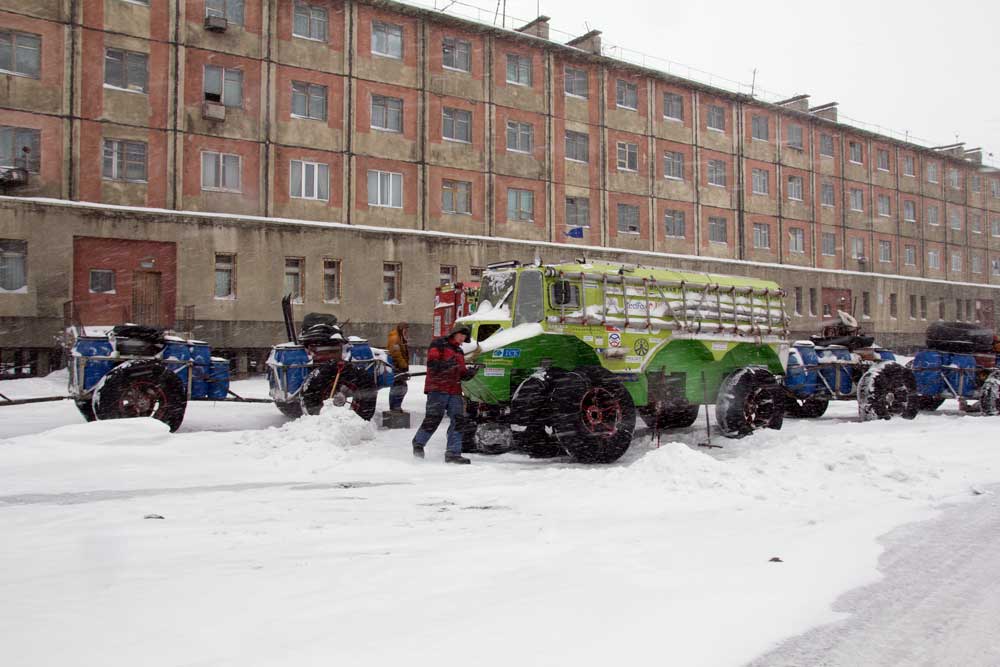
Pevek. Here we met Easter, made acquaintance with good people, repaired the hitch devices today, replaced a couple of shock absorbers, welded a wheel disk which had fractured from a bump in the hummocks. M.P. Kamensky acting as chief of the sea port allowed us to use the workshops, Vasily Vasilyevich Smirnov (UA0KAV) last year has received our cargo of wheel bands and vacuum-dried foodstuffs, kept it for the whole year, A.Ya. Kutsenko accommodated us at a comfortable apartment, S. Filimonov from local TV arranged a venturous dispute with us on international situation and offered the assistance of the Fourth Estate not only on the issues of our political enlightenment, traffic policemen pretended as if they did not see the vehicles without license plates at public roads. On the whole, it’s like in a fairy tale. But the prices for foodstuffs, utility charges and salaries here are not like in a fairy tale. Sergey, the border guard, performed the organizational management, and frankly speaking, without him everything would have been much more complicated. The third day of our stay in the civilization comes to an end, we took a rest, but did not relax completely; therefore this night, without brass bands and weeping of women, we’ll take a French leave from this northernmost town of our country. We’ll humbly, mannishly drive off in the night. We received phone calls from Dudinka-Norilsk, they are worrying, ask to drive as fast as possible, apprehensive of the approaching spring. The public shows interest to our vehicles that established good reputation during unlawful crossing of the state border; they ask about the price. With the eyes bent on the ground, I reply shyly that the vehicles are invaluable. Bewildered northerners walk off. But if Yemelyas will be cheap and easily available, then who will develop this Territory described in Kuvaev’s book? There is plenty of fresh snow, but no strong winds until now, so the fluffy snow did not turn into antitank obstacles – firm ridges. We are not planning to linger anywhere further, but we remember very well Who disposes of everything.
Again congratulations with the Holiday to everybody, and till next communication session.Yours V. Yelagin.
April 12, 2015. N69°42,057’, E170°15,407’, -15°C, 1010 mb, ODO-2165 km.
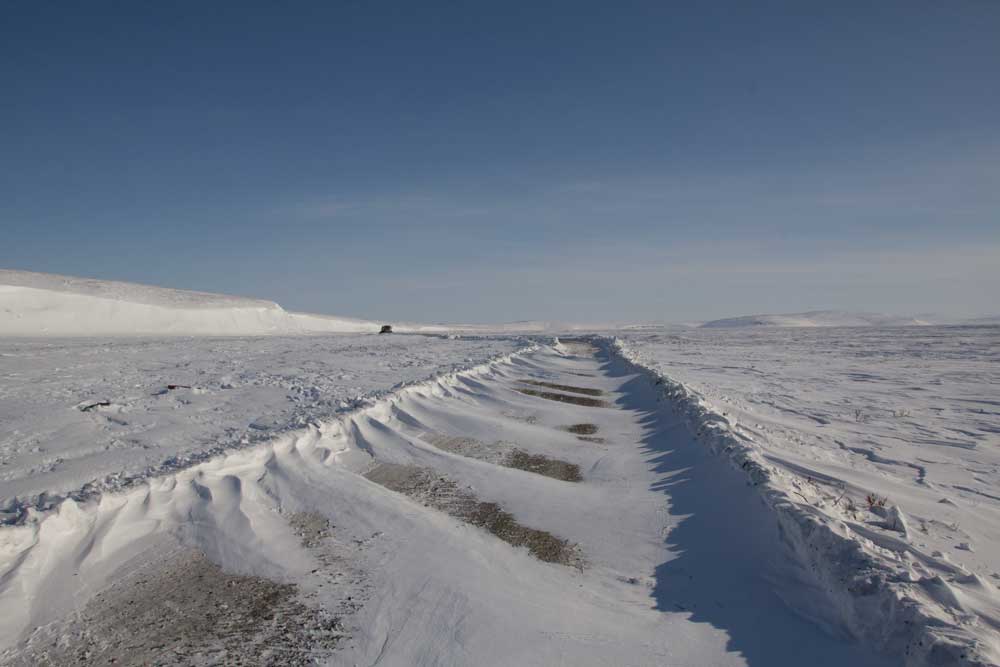

We are at Pevek. We’ve covered 550 km of difficult winter road with rather steep passes. In this case, winter road for the most part is a ditch in snow dug till tundra surface by a huge bulldozer followed by trucks at a snail's pace. Soon after the column has passed, strong wind arose, building slanting ridges of snow up to one meter high, and sometimes even higher. The wind soon solidifies the ridges, and they become impassable even for easy riders like us. Still we do not despond, we drive round, do not take the shovels yet, cope with it somehow. The weather had worsened, and we switched to two-shift work schedule. It is not known for whom it is easier to drive – for the daytime or nighttime driver. Overcoming the passes had a special savor due to the fact that for the purpose of ultimate weight reduction of vehicles, and due to uselessness of brakes during driving on drifting ice, regular brakes were dismantled and replaced by a single transmission brake caliper. Hence, at lengthy descents, especially with lateral sloping, which also pose a big problem for our super-soft tires, the skill of the driver caused such genuine interest and empathy among crew members that the codriver, under various plausible excuses, slept without taking off the clothes, cherishing a secret hope to leave the wagon promptly in case it fell in the abyss. But the Lord is merciful, and we drive along a beautiful valley which looks twice as beautiful, since no passes are expected further on. Tundra is literally completely trampled by hares, their droppings in industrial quantities are spread over tundra, but the possessors themselves are not visible. Only Obikhod at night was lucky to pass by a hare wedding party, with the number of guests not less than two hundred. That was a real wedding! A pretty fox without hurry walked in tundra, though our expedition did not cause any interest in her. We drove to Komsomolsky settlement; it’s rather a scary location; placer gold was extracted here in former time. Heaps of waste rock are everywhere around, abandoned houses, prevailing colors are dirty-gray and black, all the others are simply absent. The settlement is closed, some shadows are still wandering around, but the pulse is not palpable. In Pevek we were met hospitably, attended to the central square and shown the hotel. A young gentleman named Sergey turned to be the chief border guard at Pevek, by a single phone call he solved the problem of our accommodation, and in half an hour we were already settling in a good three-room apartment owned by «Maisky» gold-digging firm. The same company helped us with the fuel. Their chief financier and economist Alexander Kutsenko visited us, and we spend the evening wonderfully, in talks about the North. At Pevek we also performed the customs formalities with the officer specially detached for this purpose, and now we only have to «close the border» at Dudinka. People are already waiting for us there, they phoned and scared us by «global warming», as though the winter roads soon will melt away, and we’ll get stuck in tundra till November holidays. We are hurrying as much as we can, and let the chips fall where they may. In Moscow – traffic jams, here – melting winter roads - very nervous life everywhere. We congratulate everybody with the bright holiday of Resurrection, and till next communication session.
Yours V. Yelagin
April 09, 2015. N69°38,208’, E176°52,321’, -20°C, 1011 mb, ODO-1800 km.
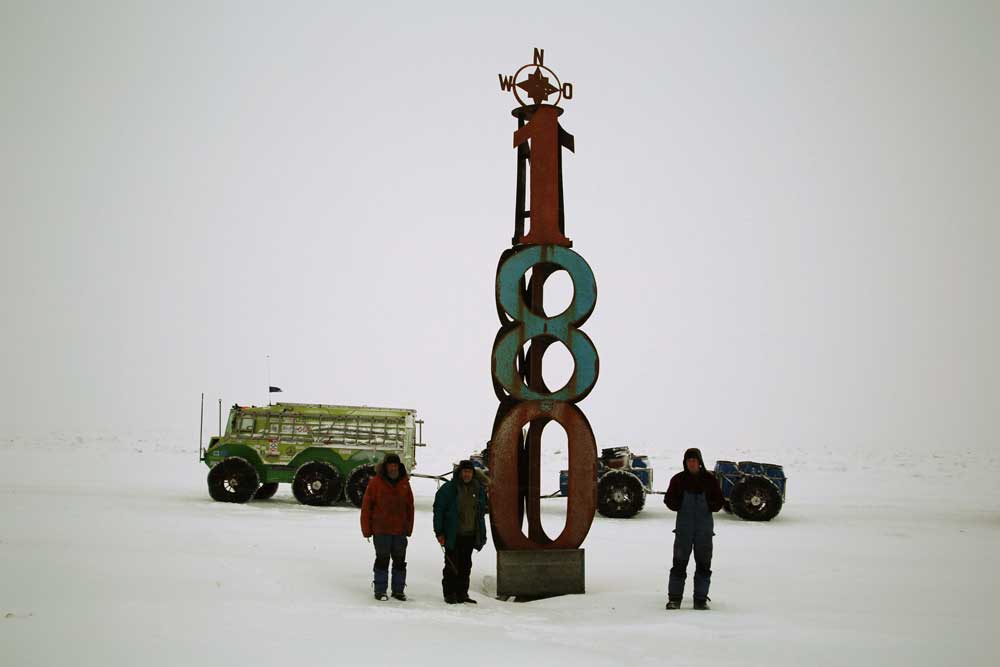
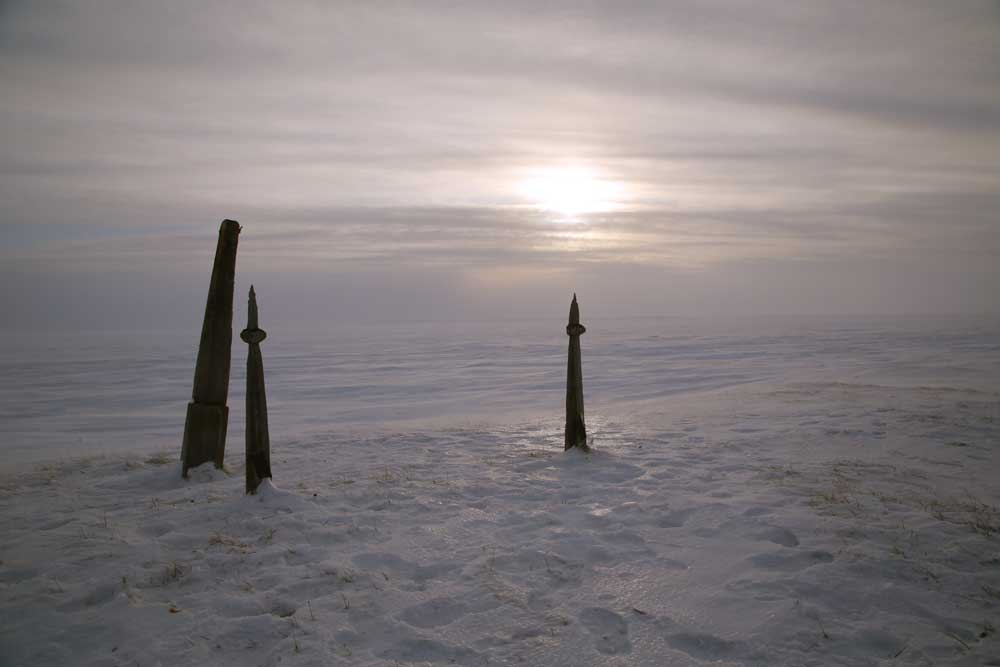
We are in the Eastern hemisphere. It’s funny: when you are standing near the stela marking 180° on the winter road, face to the North, then on the right-hand side is East, but the Western hemisphere, and on the left-hand side is West, but the Eastern hemisphere. A sound reason for rushing to the shop for some brain-washing liquor, but, fortunately, there are no shops nearby. Yesterday we passed the settlement at Cape Schmidt, formerly it was North Cape, but after O. Yu. Schmidt heroically managed to get drown an icebreaker not far from here, what was anything but simple, the cape was renamed in his honor. So we were told by the local amateur ethnographer and professional geophysicist Victor Ivanovich. The settlement is at the point of death, former population of 4000 has decreased to 55, but two policemen with captain’s shoulder marks have materialized literally within a quarter of an hour after our appearance in the inhabited locality. The length of our route through Russia to Dudinka, where the finish point of the travel is planned, is about 5000 km; it’s interesting, whether we’ll meet even only one inhabited locality where we’ll avoid passport checking. The impression is that spies are abound here, and all the employees of militia-police and other services were switched to the regime of special vigilance. By the way, it’s rather surprising, why in these services they have employees, while in the defense ministry – just soldiers, and not employees of the defense ministry. This time it was settled anyway, and we departed for tundra. The visibility is disgusting, low drifting snow, very deep wheel tracks left by “Ural” trucks, the martyrdom ended only when darkness came: in the light of powerful spotlights with LEDs from “Prolight” the winter road is seen well enough; everybody drive here in this manner when whiteout happens. In less than 24 hours we covered about 200 km, stopped for repair to reinforce the mounting bracket of the middle pad of engine of the green vehicle. Four years the poor thing takes the lead laying the track, and the loads on these components are beyond the margin. The repair – simple fitter's work, two hours, we have lunch and drive further on. We are dreaming about Pevek, perhaps there will be a bathhouse there where they will let us in, about 300 km still remain to Pevek. The weather cleared up, all is well.
Till next communication. Yours V. Yelagin.
April 06, 2015. N67°30,526’, W175°09,233’, -22°C, 1010 mb, ODO-1338 km.
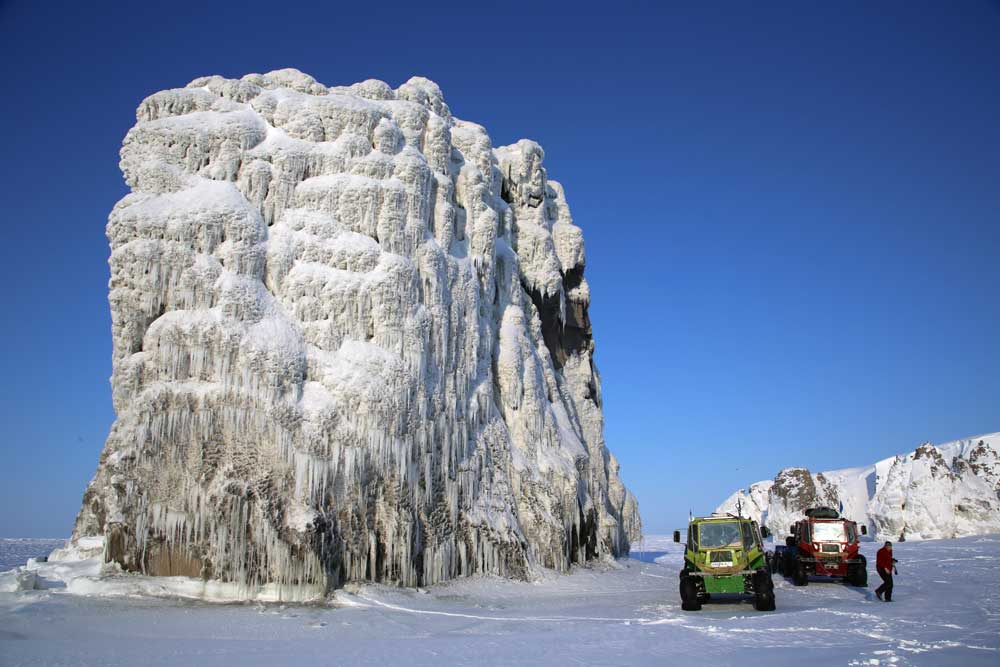
Windy morning, intense low drifting snow, colored halo around the Sun. The weather provokes loss of appetite from the very morning. Yesterday we passed Nutepelmen village, 80 inhabitants, of which 40 are children, and perhaps 80 dogs. The village looks like Canadian villages, clean, rather new houses on steel piles. Water supply – blocks of fresh ice which are dragged by a tractor. The locals live on national handicraft trade, hunting sea animals, fishing, in summer – collecting “bounties of nature”. The village has a qouta for 30 walruses, a qouta for whales also, but the tractor is not powerful enough to pull ashore a carcass of a bowhead whale, so they have to content their selves with gray whales, provided that they visit the coastal waters. Hares sometimes are so numerous that weak-nerved representatives of the fair sex snatch at the heart when a hare suddenly jumps from under the feet and runs to tundra. Kind-hearted folk took us to their homes, offered to take a bath and to have tea. The most hardened among us after the bath felt cold: they say – just washed off the fat accumulated by excessive toil, and here you are. Now it’s again about forty days of rough time until it will be warm again. A mistake that is inadmissible for people with such profound polar experience. Others rushed to the shop, to buy a chicken and sausage, or else it’s only smelt and smelt, you know, so fresh, with spawn … Before us a team of baptist propagandists drove on vehicles with wheels similar to ours, their goal is to convert the local pagans to their religion. We unscrupulously use their trails, as driving along pressed snow is much easier. They, in their turn, wish that we make the trail, and all the time we have to pretend that we have stopped for unavoidable repair, or we are delayed by that «nasty cameraman» with his film-shooting. Yesterday in the evening we were visited by a passing-by WWF bear patrol. We had a meal, drank tea, and listened to a fascinating lecture on the habits of polar bears. Presently the gentlemen are busy counting the number of bear lairs in the vicinity. Each suspicious place is checked very simply: a man approaches a hole in the snow and sticks a pole in. If no one is hissing indignantly and does not jump out – it is not a bear lair. They do not take arms, it is regarded as indecent for serious people. The serious people are – Segey of about forty, and his assistant, uncle Fedor, of about seventeen. We rejoiced that such people are among us. And we drive further to the West, closer to home, certainly not avoiding encounters with such people.
Till next communication. Yours V. Yelagin.
April 04, 2015 N67°01,111’, W172°43,985’,-20°C, 1031mb, ODO 1188km.
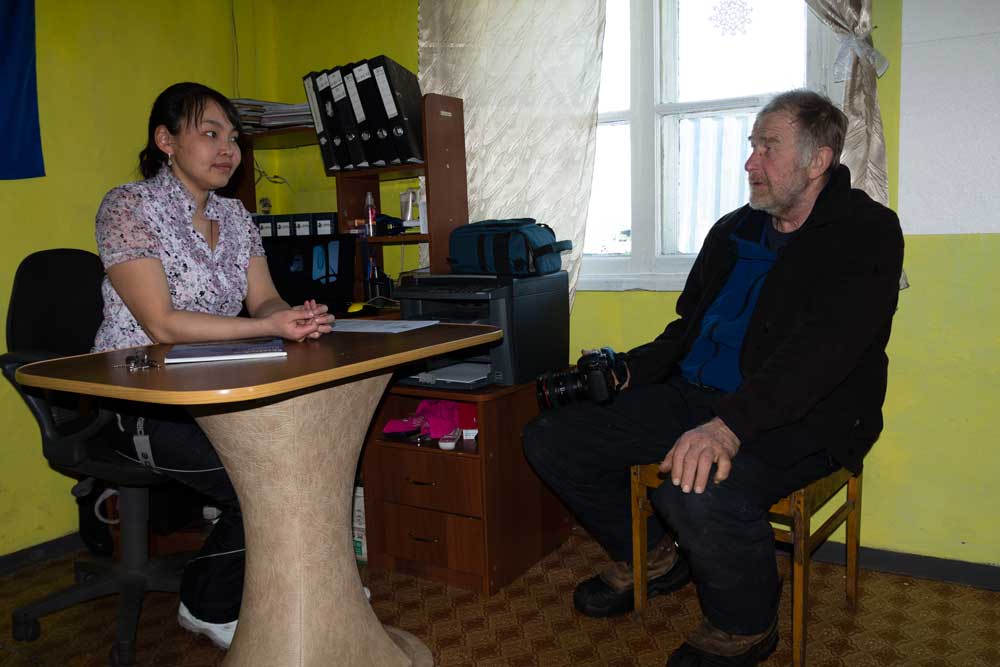
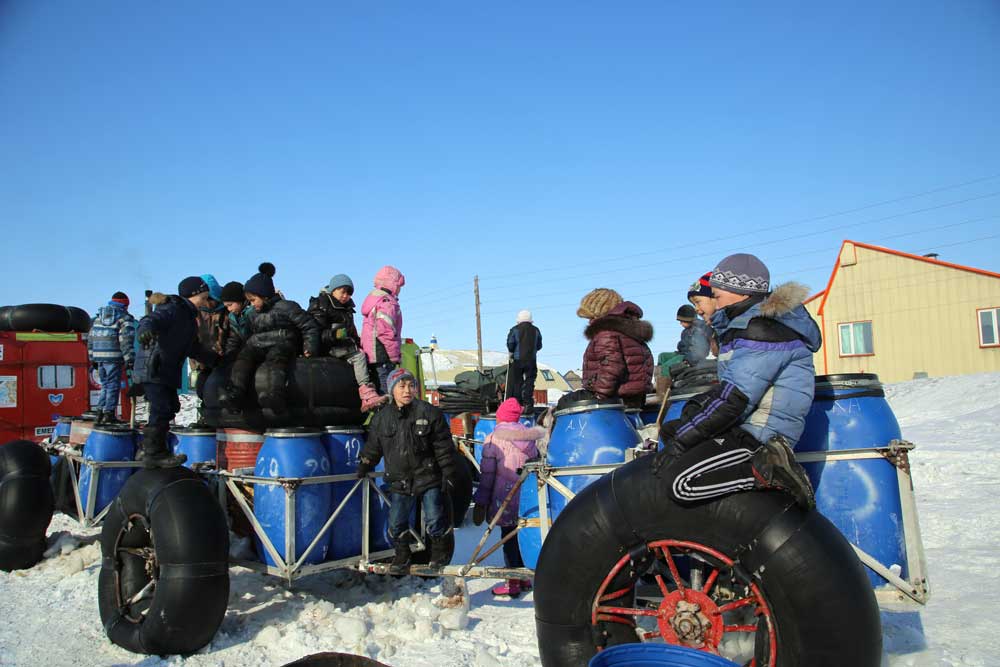
The day before yesterday we got out ashore, the Bering Strait is behind. During the procedure of passing onto fast ice, three young men on a snowmobile came to us, they helped to break the final obstacles. And on the high coast the border guards were already waiting for us; not without reason a helicopter has circled over us earlier today, and twice threw five-liter flasks filled with earth-sand. Due to overexcitement, we reckoned that it is a special ritual and we must kiss the homeland soil at first, but then we noticed that a message is tied to the vessel with the appeal to comply with the laws of the Russian Federation, especially the Law on the state border. Hopeless ice situation and irresistible desire to get away from the chaos of hummocks and ice openings and to get ashore at last were hindering the complete compliance with the letter of the law. We were requested to proceed to Enurmino settlement for execution of border formalities. In the local school the investigator began his hard job. Upon explaining to me my rights and honestly notifying about the existence of Article 51 of the Constitution, he got down to business. After about two hours of spirited dialogue, his face somewhat softened, and he said: «now I accept at last that your group really had no criminal intention during crossing of sacred and untouchable boundaries». Further on the business proceeded more good-naturedly, but still not very quickly. Almost 24 hours of strenuous work were required for detailed description of violation of the state border by an organized armed group with usage of special technical facilities.
While the office work was in full swing, the team was preparing the caravans for further travel, we discarded one trailer and part of spare tires. By the way, the last batch of shell tires produced in the glorious town of Bobruysk immortalized by Il’f and Petrov are beneath any criticism. The batch of tires sold to us is of very poor quality, though the manufacturers were informed where and in what conditions they will be used.
I think that the most impressing photos of our travel were made at our stop in Enurmino. The most active representatives of local children were playing, jumping on the trailers, and making everything conceivable to break their necks.
Meanwhile, V.N. Obikhod, accompanied by the hungriest part of the team, proceeded to the food shop where he bought all reserves of bread; we really were sick for it. There are many good things in America, but bread is not on the list. The most vigilant local residents immediately asked in the shop: «how can it be that you sprechen [speak] Russian so good»? It turned out that all the population of the settlement was notified about expected arrival of a delegation from America; many villagers even started improving their skills in speaking English. There is a GBOU NOSh in the village; for those less educated, I explain that it is the name invented by our bureaucracy for junior schools. It stands for “State Budgetary Educational Institution - Initial Comprehensive School”. The children that grow up are sent for studying to the boarding school at Lavrentiya settlement or other centers of civilization.
Some houses are new, some are old; the new ones are bright-colored and look more cheerful, but the people are sure that this beauty is ephemeral, as it should be; while the old houses will last for a long while. There is a single diesel generator in the village, it operates already for three terms. During our stay it stopped several times during one day. In case of its failure, the village with 340 residents, of which about 120 are children, has no electricity. The territorial administration receives letters with pleas for help, but they have no time to reply, very busy. Zoya Mikhailovna, the head of the local administration, an awfully pretty lady of about 25, toils on her action post with full energy of youth. After bidding farewell to the officers of the border guard and with Zoya Mikhailovna, we headed westward. That’s how matters are. All the best, and till next communication session.
Yours V. Yelagin.
March 31, 2015. N67°09,682’, W172°03,106’, -18°C, 1005 mb, ODO-1105 km
W wind, 5-7 m/s, very humid, whiteout, more than substantial hummocks.

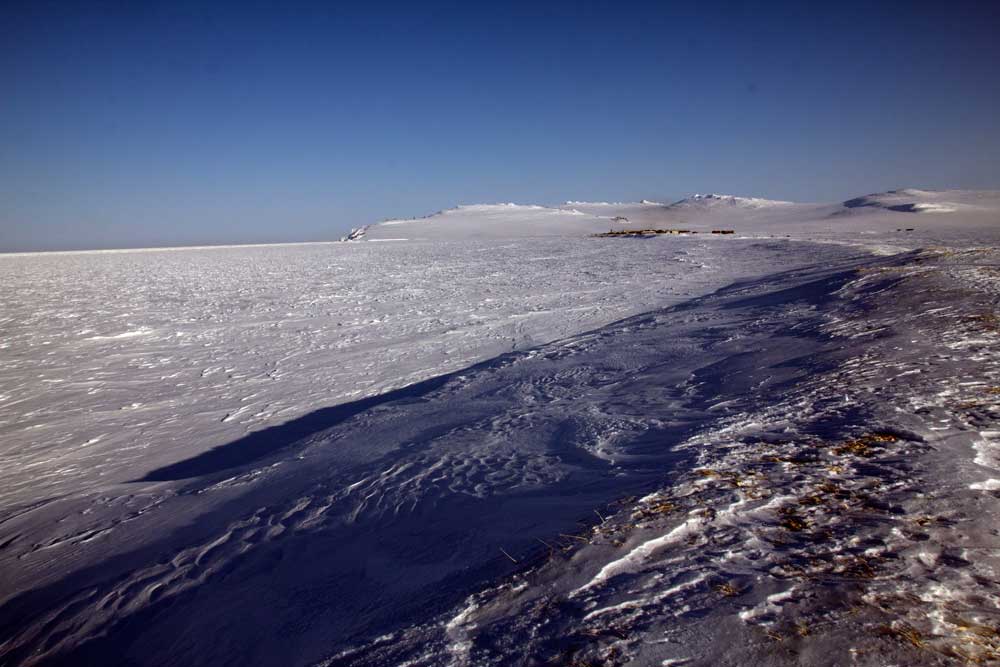
I declare with full responsibility – the Arctic border of Russia is guarded perfectly. Endless fields of hummocks, ice opening under black fog, malicious bears in the night, and dazzling haze, to make it worse. That's the mess. And we, poor creatures, are in the middle of this horror. Today, after all, notwithstanding the perfect guard, we managed to barge into the limits of territorial waters, and continue to move further. Nobody knows what will be the outcome of it, but, regrettably, the ice situation leaves no other alternative to us. We stopped for night camp not too late, at 19:00, the recent three days of especially hard toil for laying the route to home across the multi-layered defense have completely exhausted the record-setting workers, and no objections against early stop were noticed among the toiling masses. 18 km are left to the native coasts, we are moving at the pace of turtle, today we covered 14 km, of which only 9 km are effective, and that is not the worst day. The forecast, regrettably, came true: the weather went bad, we hope it will not last for long. Moving through the fields of hummocking, we often use our main optical instrument – the ladder on the roof of the green vehicle, but in the conditions of whiteout it is practically impossible to evaluate the distances accurately, and it is almost useless. Today we saw the remains of a bear’s meal – part of the spine and ribs of a seal; the bear ate itself and left something to its permanent companion – the polar fox. Someone is joyful, while someone, you understand… In general, the food chain in action. For supper today we have the sliced frozen whitefish, boiled rice with finely chopped sausages, tea with sweets, and perhaps 50 grams for record-setting work. Obikhod with Ushakov today washed their feet, they walked in the snow with red bare feet, I gave to myself a successive word of honor to join them tomorrow. They do not demonstrate their superiority outright, the upbringing does not permit to, but a subtle touch of contempt, alas, is felt. It’s this scribble that takes all the time, there is no time even for washing feet.
The best wishes, and till next communication session. V. Yelagin.
March 29, 2015. N67°18,869’, W172°07,183’, ODO 1077, -22°Ñ, 1015 mb.
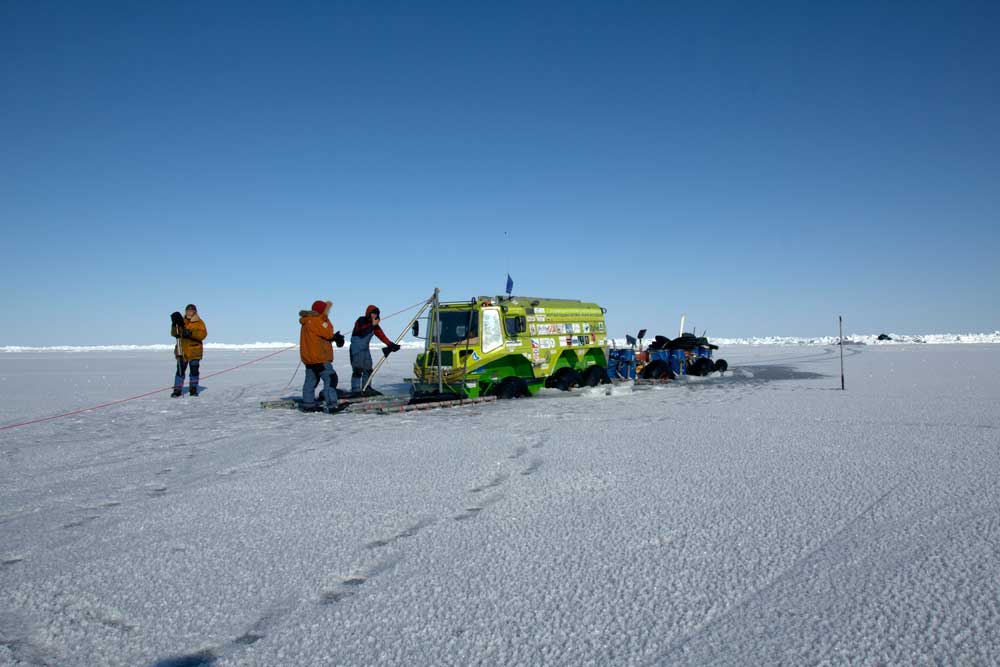
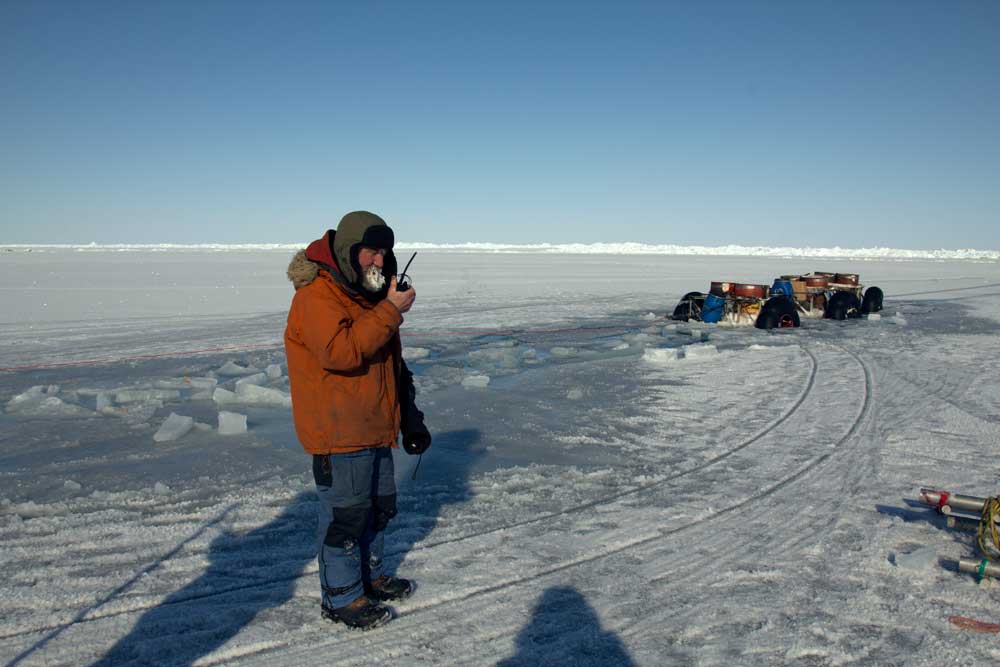
The morning is frosty, -28°C, the wind is still from the North, as requested, and the drift ceased. So, the ocean lives its own life. We go for a walk in the direction of the ice opening hoping to see the changes on the Arctic acting area. Thickness of the nilas has increased substantially: the night frost was about -30°, at night Shkrabkin’s feet become cold, which is the most accurate sign of good frost. Following the results of the reconnaissance walk we decide to depart, at first by complete caravans, and at the places of weak ice to drive the vehicles separately, and then to pull the trailers by rope, we have about 800 meters of it. The ice turned out to be completely wet and loose, in short, at the middle of a wide ice opening the green caravan breaks the nilas. It is more than 100 meters to the shore in any direction, the ice is weak – if the vehicle has broken the ice on the run, getting out of water in statics is almost impossible, the only option is to break the ice and to pull the vehicle by a winch or by the second vehicle to the coast. In whole, entertainment is for a day or two. The head is working feverishly – how to avoid the additional labor duty, and as a result the ladders are laid on the ice, old tires folded in two over them (we do not discard anything, not only due to environmental considerations but of simple greed, perhaps it might be of use sooner or later), we prop the legs of our letter «?» against this arrangement, the red vehicle by jerk pulls the nose of the green vehicle from water to the ladders, and breaking the thin ice on the run, it jumps to the shore at maximum rpm. Later during the day the caravans broke through the ice three times, the drift started pressing them, - in whole it was a real adventure; we got together on the shore with all our belongings only late in the evening. Already in the twilight, looking from a high hammock for a comfortable clearing for the night camp, we noticed two large bear cubs running at full speed away from a large bear. It seemed that the grown-up was ready to trade-off the moral-and-ethical principles and to devour the cub that was running not so fast. Seeing the group of spectators on the hummock (i.e. us), the bear switched its attention and headed directly to us for making acquaintance. We run for the gun and were glad to test a special frightening device in an aerosol container with a pretty horn. The device screams so loudly that ringing in the ears continues for a long time afterwards. Kolya Kozlov, the most bold and experienced in handling firearms and sound weapons, courageously went in the direction of the predator. I persuaded him to take me with him, so that there was a living witness of the heroic deed. At the necessary moment in the cold the frightening device made a hardly heard preagonal sniffling and was gone. Obviously, the manufacturers of this wonderful device think that the bears do not live in cold environment – in warm conditions everything operated perfectly. After the warning shot of the 12 caliber the bear stopped with interest, but did not run away. That’s our way of life, waiting for a night attack on our foodstuff warehouse. Still, it seems that the ice opening is behind us. That’s how it is.
Greetings to all, and till next communication session. V. Yelagin.
March 27, 2015. N67°20,709’W172°03,845’ ODO-1061km, -16°C (16:00), 1007mb.
I guess that judging by the lack of messages form us during the previous three days, it may be presumed that our situation is not very good. Four days we are trying to find the pass across a huge ice opening about six kilometers wide and stretching from us for about one hundred kilometers at azimuth 300°. From the point where we approached it for the first time, during these days we have passed more than 10 km along it in the western direction, bumped into fields of severe hummocks with deep loose snow, returned back to the starting point, and after staying overnight continued to explore this “gift of fortune” in the eastern direction. At the present moment our camp is about 10-11 km to the east from the point of meeting with the ice opening and one kilometer from the coast. In the morning some team members put on skis, others – snowshoes, and went to investigate the problem. During these three days the ice became thicker, at some places it is possible to go over it on foot, but the vehicles are out of question, the more so because streams of fog at a distance indicate fresh ice breaks or appearing nilas. The meetings of the labor team with the agenda – in which direction should we drive – always cause lively discussions. This testifies that the participants have active living position, but in the first place – that they have a genuine desire to return to the homeland-mother; however, this desire, to our deep regret, is not mutual, otherwise mother would not arrange such water obstacles on the way of so devoted sons. Our appearance on the border of territorial waters caused true interest among the military. Suddenly a helicopter with stars on the sides appeared above us, hovered for some time and flew away. It did not respond to our sincere invitation to land. It was a pity, as the officers might tell us where is the best place to cross the ice opening. Then the AN-26 airplane was nearby, though perhaps it just by chance flew near us; and as a picturesque conclusion, our native crow appeared with melodious croaking. After its departure, patience again returned to the airspace above us. But there is no patience in our souls, – some are deciphering the satellite photos – where the ice fields will move, while the ice drift is neither large nor small, about 7 km per day; others are clattering with icepicks, demanding to be given the command to make the road to home immediately. The wind in this part of the Chukchee Sea does not play (until certain wind force) the decisive role in the ice drift; the streams are more important. Drift in the direction W-N-W continued in spite of headwind, if the wind was not too strong. Bear traces are everywhere. Their life is not easy after all, visiting each crack, looking under more or less suspicious hummock… Some are hardly dragging their paws along in grief. Sometimes they fall through the ice, and then move further, job is job. In a word - poor creatures. Large bearded seals (squareflippers) stick out of the water in groups, looking at us. We did not see any walruses yet. We are waiting for the northern wind, strong enough to move the ices and to close or at least to narrow this ice opening. And then we’ll move in the direction of home right away, we are missing our relatives, we want to embrace and to kiss everybody. That’s how our matters are. Don’t be upset, we still have good meals, and walk much in the open air surveying the surroundings.
Greetings to all, and till next communication session. Yours V. Yelagin.
March 24, 2015. N67°22,240’, W172°07,185’, -24°C, 1018 mb, ODO-978 km.
Two events happened yesterday: we saw the mountainous Chukotka coast from the distance of about 40 km, and a polar bear from the distance of 30 m. The beast came to our vehicles during lunchtime. It was full of curiosity and intended to come closer, perhaps to look into a vehicle, but I spoiled everything. I peeped out from the hatch with the camera and started taking photos, while Alexey Nokolayevich was video shooting from the open door of the vehicle. The bear was upset by such impudence from our side and retired without hurry, full of dignity. It was really good, apparently not elderly, perfectly white as if from the dry-cleaning, of medium size. Today’s driving was not very successful, soon after start we run into a stream over 400 meters wide, moved to the West hoping to find a narrow spot, meddled into severe hummocks, went on foot to the stream twice, the second time already from the overnight stop, found a place not so wide, just over 100 meters; we’ll see what the morning will show. In the evening ice was hummocking not far, it could be heard well enough, but we did not come nearer to have a look. The day was clear, we’ll wait for a new satellite photo, and all in all the morning is wiser than the evening, let us have supper and go to sleep, - we had plenty of walking today. Cheerio, and till next communication session.
Yours V. Yelagin.
March 22, 2015. N67°28,320’, W171°45,060’, -20°Ñ, -1020 mb, ODO 922 km.

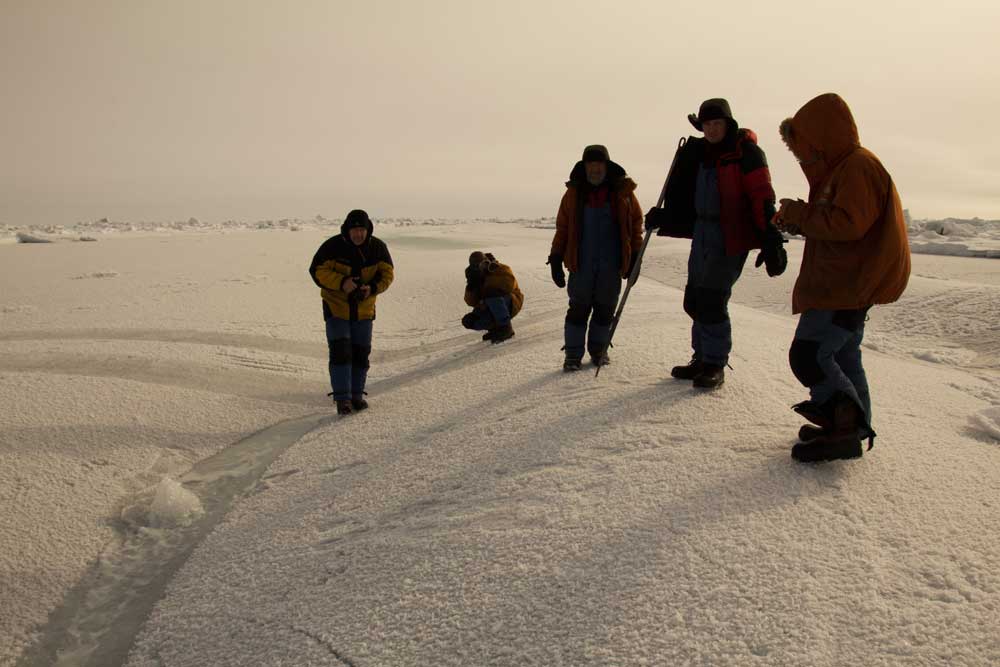
The last two days we are making our way in continuous hummocks. Yesterday was a whiteout, but the terraain was a bit easier; today is a clear day but this did not help us to cover more than 17 km during the whole day. We have driven 22 km, of these 17 km are useful. The ratio is not bad, but that is a poor consolation. The north wind blowing for the third consequtive day has finally forced the ice to move. Yesterday we hopped over a rising hummock ridge in a rush mode. A lot of loose snow hides the ice blocks under it, very hard work for the vehicles. Walking is also very difficult; making a step you get on an ice block, and with the next step you suddenly fall down waist-deep, and that is not the worst option. Bear traces are so numerous that we suspect they want to suround us and to commit some nasty trick, taking advantage of numerical superiority. At that, they are hiding carefully; local bears have no curiosity which we are accustomed to and no dreaminess, something like: “I”d rather lie quietly somewhere not far, perhaps someone will step away from the vehicle”. The traces of one of the representatives of this glorious cohort of high-latitude toilers amazed me with their size; the gentleman might weigh about 700 kilograms. We were so impressed that in the morning we went to look for the road with a gun.In the second half of the day we took the fire arms away out of sight, and during yesterday’s supper Nikolay Nikolayevich was examining us on the topic: «your actions if you meet a bear». Not everybody passed the exam successfully, a second attempt will be today. Especially difficult is the question about correct behavior of a person when a bear is lying over him, let it be just an average-sized bear, only twice heavier than a large Amur tiger. When it comes to details during the exam, usually the examinees lose their nerve and ask permission to leave. That’s how the matters are. Best wishes, and till next communication session.
Yours V. Yelagin.
March 19, 2015. N68°15,684’, W171°01,336’, -30°C, 1024 mb, ODO-813 km.
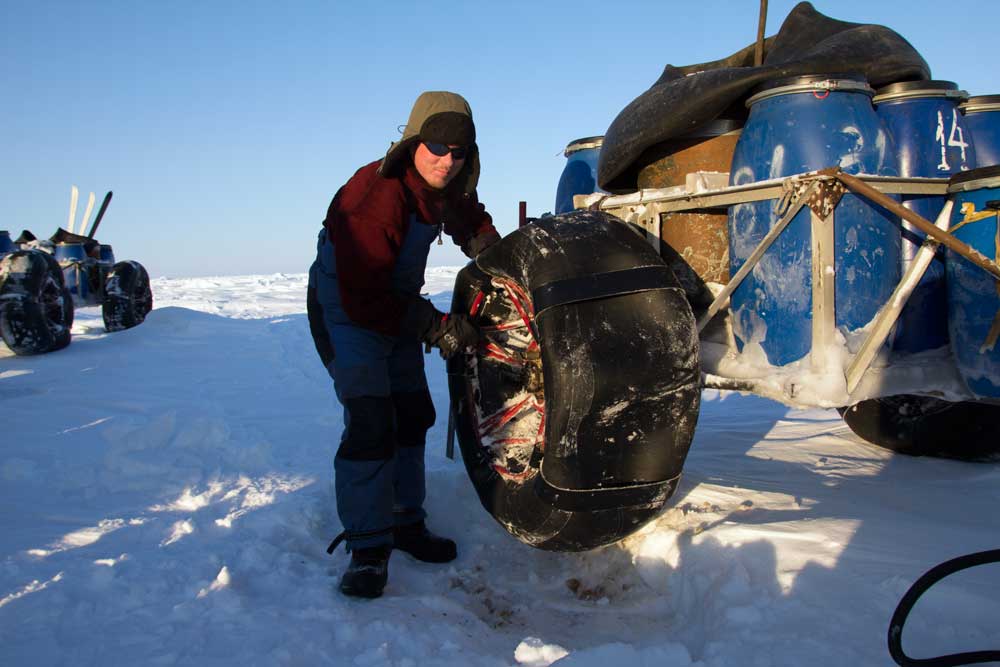
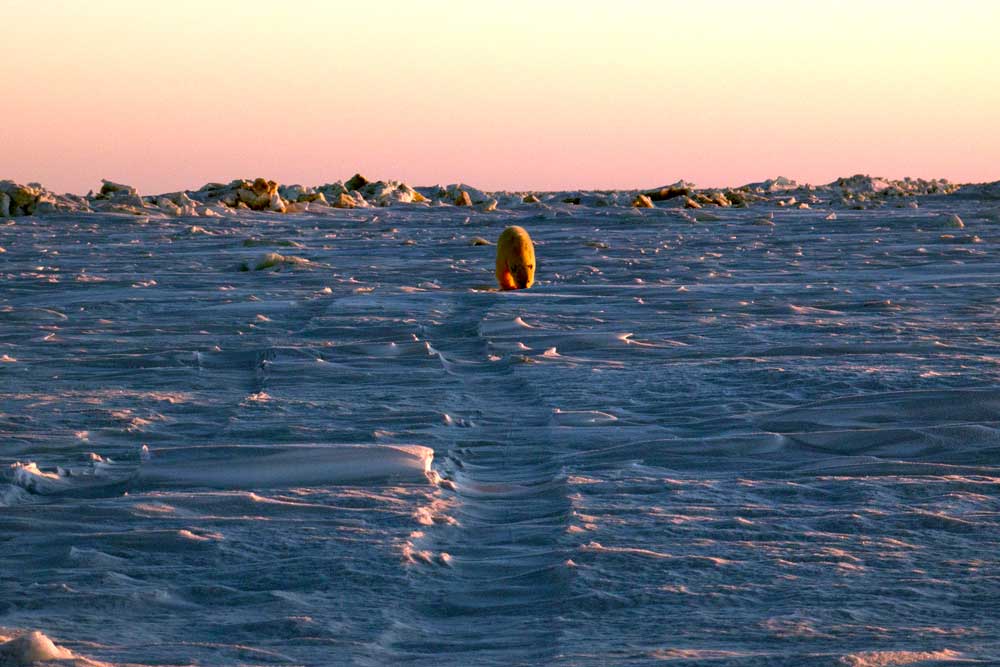
The weather is clear, frosty, fair. All day long heavy driving on the 1-2 gear over the fields of total hummocking. The hummocks are not large but all the same nasty, the more so because apparently it snowed here not long ago, and the load on the transmissions of our vehicles increased. For the first time this year we saw a bear. A timid one, in contrast to the beasts at our Severnaya Zemlya, those sometimes come to the polar station and try to get into the windows, sometimes choke a dog to death. Yesterday evening we saw a beautiful aurora borealis, made photos. For today’s supper we shall have boiled venison with fat, tasty broth, a gift from Alaska inhabitants, soft-salted salmon of the same origin, and tea. By the way, recalling about the fish: standing recently at the edge of a large ice opening and preparing for a collective medtation, we saw a large fish splashing by its tail; certainly it was not as large as in the Southern latitudes, but still quite impressive, about the size of Vladimir Nikolayevich. We live in expectation of the occultation, I mean solar occultation, we hope that the weather will be clear then. In winter I received a letter from a Frenchman who attempted to hire our vehicles for transfer to the North pole by the moment of the occultation. He proposed double fare as compared to the taximeter. I was compelled to reject the proposal, because we haven’t got taximeters. But it was pleasant to know that there is a public opinion around the world that we are something like a «Hey, take a ride!» firm for trips to the North pole. Quickly, reliably, no jams. Just 147 km remain to the coast of the Motherland, not much at a superficial glance, but the question is, what kind of terrain will be there. That’s all about it. Greetings and the best wishes to everybody.
P.S. Urgent news from the red vehicle: no broth for supper, simply the venison. The broth was spilled on the floor, the crew is heroically struggling with fatty contamination of the machinery in the conditions of polar night.
With kind regards, yours V. Yelagin.
March 18, 2015 N68°46,140’, W170°34,970’, ODO 746km, -29°C, 1019mb
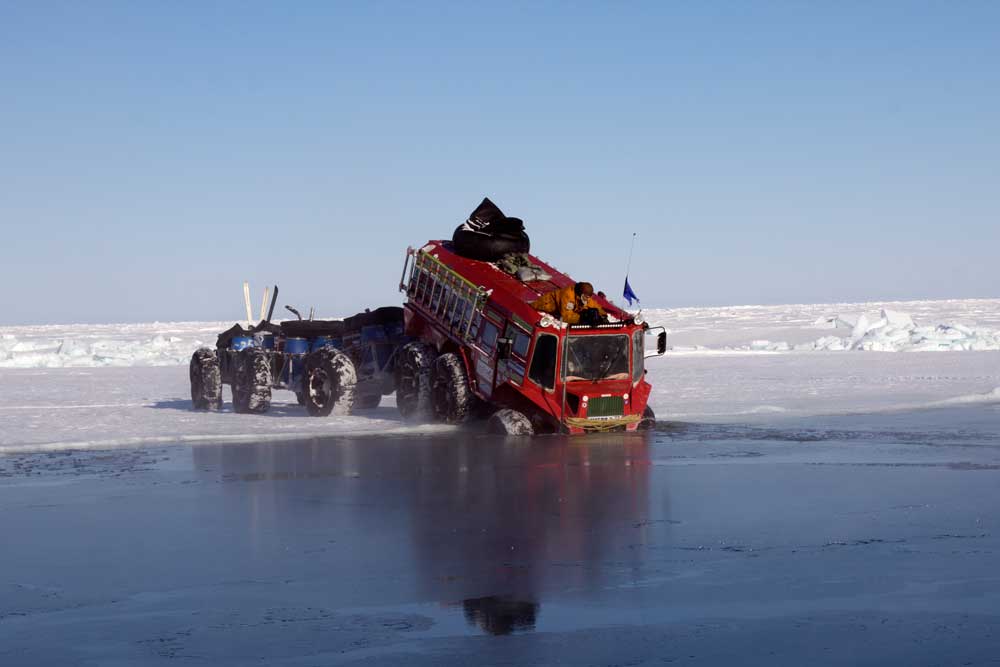

It’s almost no wind. All the day it was ordinary driving, if this torturing of vehicles may be called “driving”, but they hold on; the amount of fuel is decreasing, we eat well also, so the caravans become lighter, and the load on the engines is gradually decreasing. And the workpeople today were busy with the traps, and also sailed a little. Regrettably, no impressive photos were made, nobody fell in the water, the weather is sunny, there was no black fog, hence there is nothing suitable to intimidate the reader. The day passed without any feats, but we also need to relax somewhen. We are dreaming about clear weather, even though for the next few days, so that a satellite might make good photos of our neighborhood; not only for finding the optimal route, but also for making photos of a solar eclipse. The recent photos demonstrated a huge coastal flaw lead near the Chukotka coast, 20-30 km wide. Though our vehicles are capable of sailing quite well, still they are not steamboats, and we are ready to depart for such a voyage only if the Motherland will give the order, and perhaps will repeat twice. That's it, again I did not manage to avoid frights, what a gloomy man I am.
With kind regards, yours V. Yelagin.
March 17, 2015 N69°10,743’, W170°06,975’, -29°C, 1008mb.

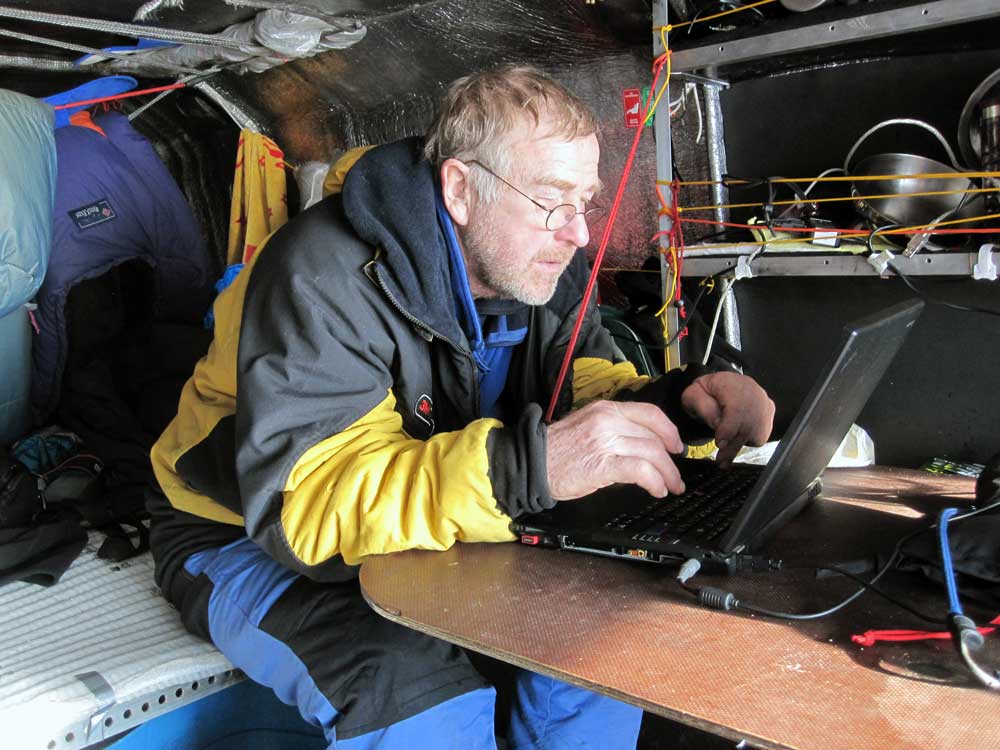
In the morning the driving was good. Most probably, there were several reasons for this; firstly, the decent terrain of the water surface; secondly, we approached the invisible border between the previous day and the next day. Even the awareness that life will soon become shorter by 24 hours did not flag the spirits. The well-educated people might make an objection that when we were flying from Moscow to the West for almost 24 hours we were extending our life, and now it’s just recovering the balance. On the border we waved the flag, made some photos and moved further on, now on our native ice. At first even the hummocks seemed more gentle than the American hummocks, but soon the Mortherland started throwing surprises – either breaks, though not wide but numerous, or a huge ice clearing with black water and black fog over it. A spectacular view, not only for our navigator Victor [a novice in the Arctic], but even for us, the old dodgers. The ice clearing had a narrow spot, but the traps were too short; by means of strenuous collective meditation lasting for an hour and a half we managed to bring together the ice fields by the deficient forty centimeters, and to move over to the next adventures. Wiping off the abundant meditative sweat from the foreheads, we approached a river about thirty meters wide; our organisms, exhausted by the previous energetic feat, were not ready for a second displacement of ice fields, tharefore we just sailed. Cleaning ice [off the vehicles] in the beams of beautiful sunset was somewhat blurred by frost of about -30 degrees and wind with the same black fog. During supper the harsh faces of polar explorers became kinder when it was announced that they will be obliged to drink a sip in honor of the Motherland.
Greetings to everybody, V. Yelagin.
March 14, 2015 N69°32,230’, W168°43,745’. ODO-600km, t-30°C, P-1014mb.
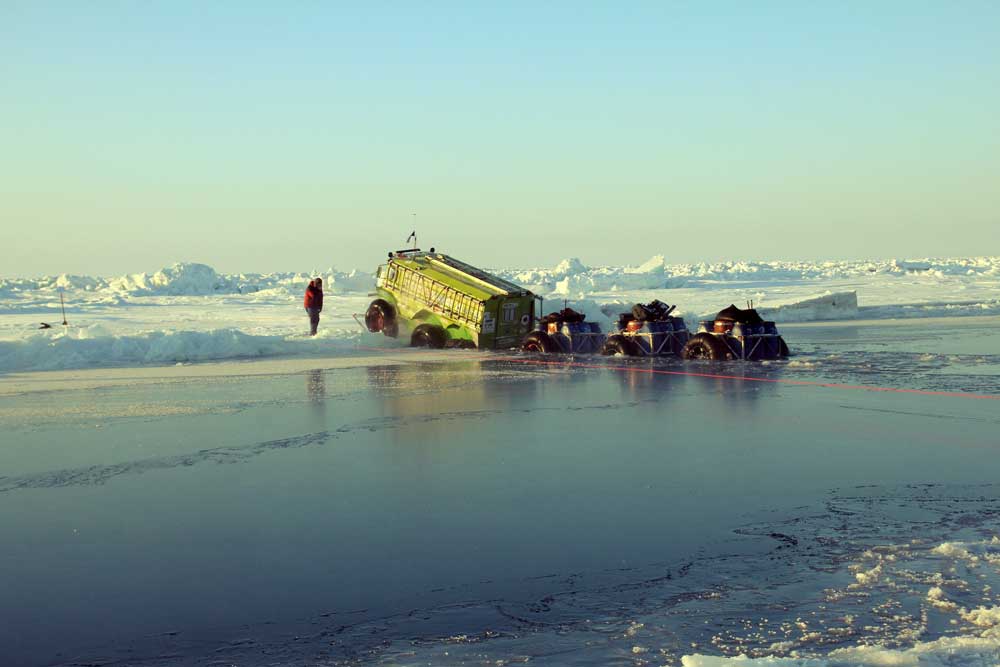
The morning is clear, almost windless, all day long we have crossed the channels covered with fresh ice. The ice is wet, it may be punched by several blows of an icepick, but still it holds the vehicles, during the entire day we did not fall through even once. By five PM we came to a river about 40 m wide. We became disaccustomed to sailing, stopped on the bank, looked at two seals, felt awfully sorry for ourselves and for the vehicles, drove along the river hoping to find a place where it tapers out. Then someone noticed that the banks seem to come closer, though slowly. About an hour and a half passed, finally I lost my nerves, and with a rigorous voice I ordered the gentlemen to sail off. For a long while we untangled the ropes, but when all the gear was ready at last, the process of forced crossing was fulfilled quickly and uninterestingly, not to count for the fall of one of the gentlemen from the boat into the water and successful retrieval from the Arctic baptistry. Congratulations with taking baptism! As for the rest, it’s all the same, 10,5 km left to the date line and to the final departure from America. Well, at least at our side a submarine with machine guns should rise to the surface, no kidding at our territory.
The best wishes to everybody, and till next communication session.
Yours truly, Vassily Yelagin
March 13, 2015. N69°41,425’, W167°36,880’, ODO-540 km. t-30°C, P-1016 mb.
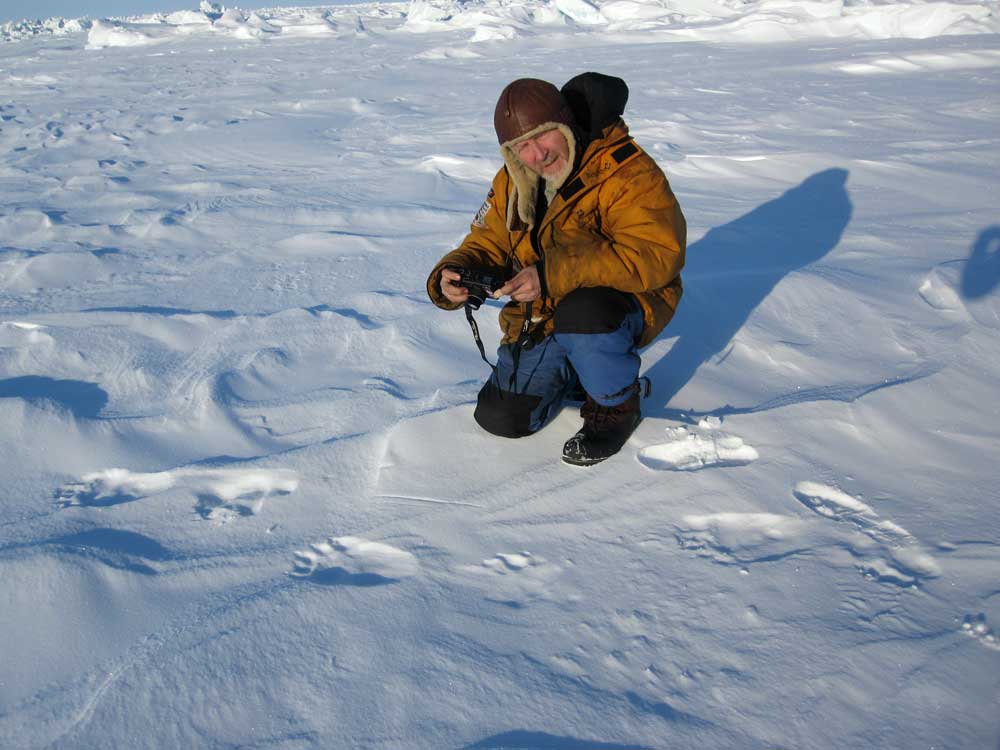
In the morning we received a good photo from V.M. Smolyanitsky, many thanks to him, as well as to everybody who helps us with communications, «relieves» the messages and monitors the entire message flow. All the day the road was not bad, but there were many ice openings, luckily for us covered with fresh, but sufficiently strong for our lightweight vehicles, ice. In suspicious places we tested the strength of this ice by an icepick, which bid us farewell at some wonderful moment and left for the the bosom of the sea. Three icepicks still remain. While before there were four of them. The one that had bid us farewell was the best. Other interesting facts: we saw traces of a moderate-size she-bear with a bear cub, though the first appearances of their offsprings in the society the mother-bears usually practise in late April. Obviously, this particular mother-bear does not know the laws of nature, and perhaps does not wish to know.
During the day we covered 77 km, not bad for the terrain completely covered with erosion ridges aligned transversely to the direction of our course. 77 km across the trough – that’s not like just crossing a field. We moved until darkness and even in the darkness, anxious to get home. There are words in a song by Vizbor: «the Eastern Europe is far away, the Eastern Europe is to the West». And for us the Far East is far to the West. The date line is 60 km [to the West] from us. We shall cross it, and our life will become one day shorter; seemingly not much, but still it is a pity. We are being awaited for at home, and I hope that knowing this will help us to overcome the shortening of life and other severities of the travel.
Until tomorrow communication, and the best wishes.
Yours truly, Vassily Yelagin
11 ìàðòà 2015. N69°54,770’, W164°44,844’, t-30°C, P-1028mb. ODO-412km.

Today it was a frosty (-36°), clear morning, the red vehicle was leading all day long, Nikolay Nikolayevich was at the steer wheel, we covered 35 km before lunch time; then the trouble came: one of the members started praising how good we are driving, and the good track soon ended. Such acts are inexcusable and have to be washed off, if not with blood, then, at a minimum, with sweat caused by working with the icepick. By the end of the day we approached numerous fresh breaks, frosty sunset and steam, it’s beautiful. There is no wind, but the breaks are there: the stream is working. Each break is being well accounted for: large-size traces are seen along the edge. The supper today includes the soft-salted salmon brought from the USA and salted yesterday, and fish soup made of fish heads tenderly piled up by V.N. Obikhod after making sliced frozen fish from the owners of these heads. Bon appetit to everybody on the mainland.
Yours truly, Vassily Yelagin
10 ìàðòà 2015, N69°55,383’, W163°43,028’, t-35°C,P-1034.
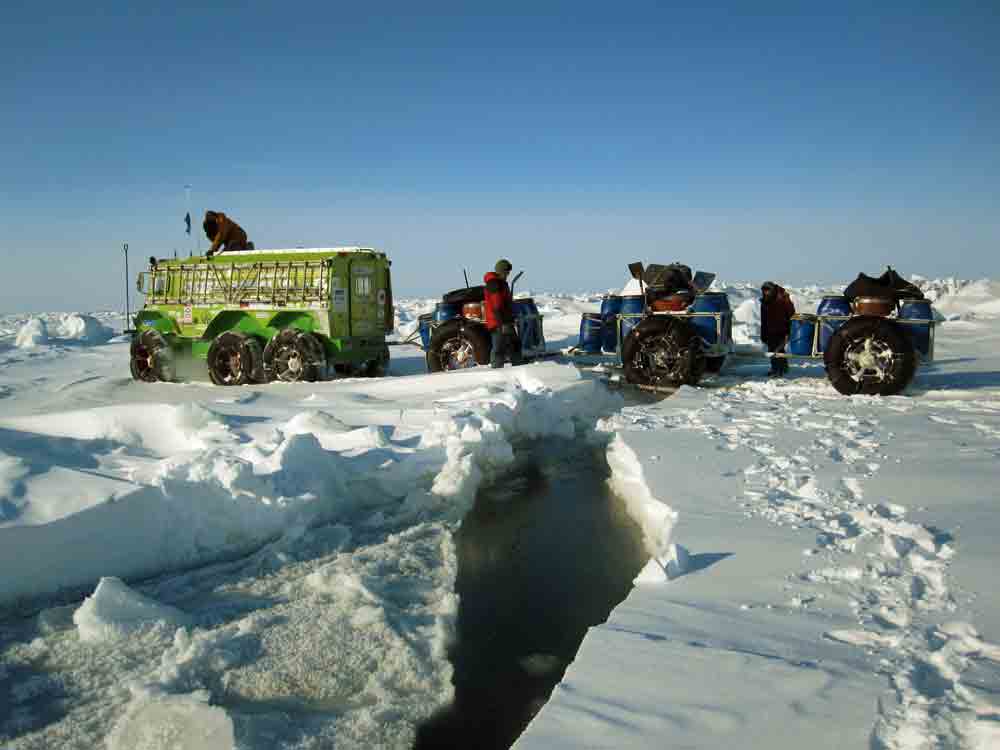
Full moon has ended, and fine weather has settled at last. Frost, the Sun and no wind – in short, the dream of a man who is craving for reaching the Motherland across the drifting ices of the Bering Strait (life demonstrates that some such specimens may be found). The weather is good, but still the hummocks were not abolished, today all day long we spent with icepicks in hands, discussing the alogisms of the Russian language in the process of ice chopping. Just look, we are “splitting” (êîëåì) ice, but we are “cutting through” (ïðîðóáàåìñÿ) the hummocks, ruther than “splitting through” (ïðîêàëûâàåìñÿ). Funny, isn’t it? The ice is frozen, it splits easily, and generally speaking, it is healthy to work in the fresh air. There are many fresh cracks, many bear traces, but still the guys are not eager to carry through the deep snow a gun in addition to the icepick. In reply to my yells that their relatives are waiting for them at home, they courageously say that they will defeat a bear with the icepick and the sign of the cross.
We are in neutral waters now, departure with the America was somewhat commonplace, no submarine with machine guns appeared, no passport checking, no filling-in of declaration templates; only a bear is dangling around nearby, judging by the fresh traces. The morning was cheerful, we received two photos, quite informative, one from Vasily Markovich Smolyanitsky of AARI, the other from Rainer Zietlow, the German traveler who supports us. The photos are good, in contrast to what they show. Because they show numerous breaks, cracks and ice openings, some of them of enormous size. But, as you know, “warned ahead means being armed”, and that is not so bad. At this major tone I am bidding farewell to you who are anxious for us, the best wishes and till next communication session.
Yours truly, Vassily Yelagin
March 8, N69°56,080’, W162°46,794’. ODO 319 km. P-1022mb.
We are staying not far from the coast, busy with the household: some are putting the vehicles in good order, some have plunged in the computer, some are writing letters with appeals to the international working-class solidarity and asking to send us a couple of decent-quality satellite photos. The weather is clear, certainly the photos are of honourable quality, but the 8th of March is rising again as an unsurmountable obstacle on our way. Somehow we are not lucky with the weather this year, it is always cloudy, and when it becomes clear – it is the holiday at our Motherland, and everybody are bothering not about us, instead of keeping a fast and thinking about salvation, they rush for buying mimosa and champagne. That’s untamed flesh and damned hormones! Yesterday, submerged in the thoughts about the high-pitched, we broke the front tow-bar of the red caravan.
The sea salt and overload had weakened the duraluminum, and in addition the thoughts about the high-pitched, - so, here is a repair for you. Repairing the broken assembly we are repeating a mantra every time: «we must drive patiently, we must take care of the equipment», and so on. But a man is weak, neither the Lent, nor the mantras can extinguish the passion of a gentleman at the steering wheel – hence repair again, the caravan is at a stop, again the mantras are repeated… Today we are planning to leave the coast and to go to the ocean, just twelve miles – and we are in neutral waters. There is something in it, in spite of complete abstractness of these concepts at the present location. Here one may cover hundreds of kilometers without meeting anybody. So, we are waiting for the end of the holidays, or at least for the evening to come, that is the day in Moscow, when those will wake up who are ready to help us even during the nonworking days. Get up soon, you sleepyheads. Time is not waiting!
Yours truly, Vassily Yelagin
March 6, 2015 N70°12,084', W162°19,340', 19:15; UTC-9; ODO 281km; P-1005mb
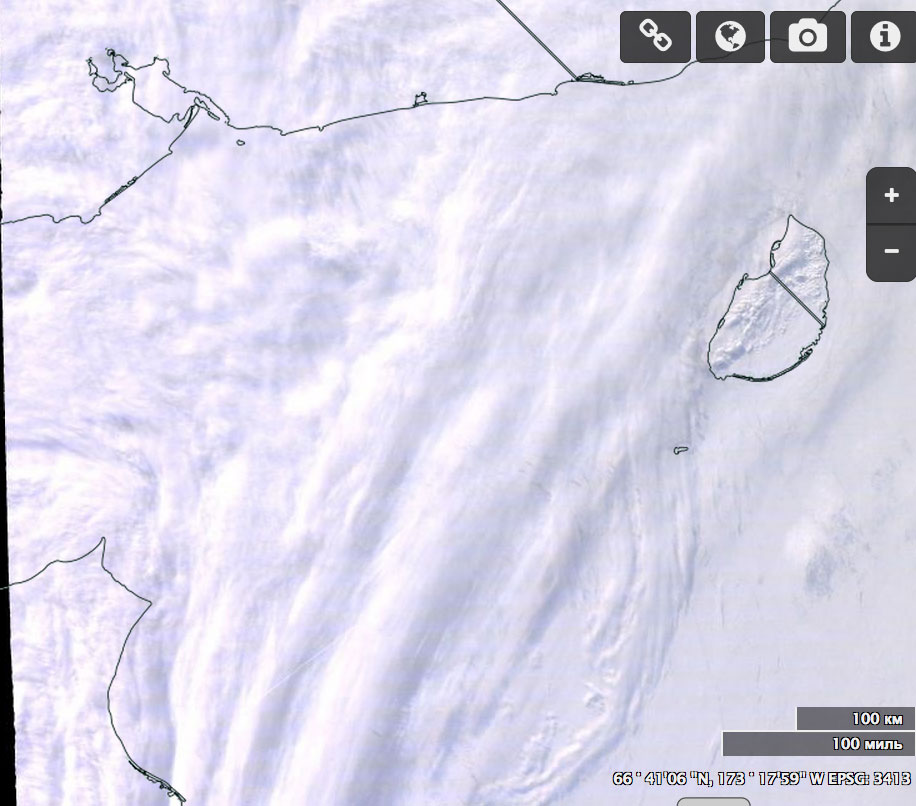
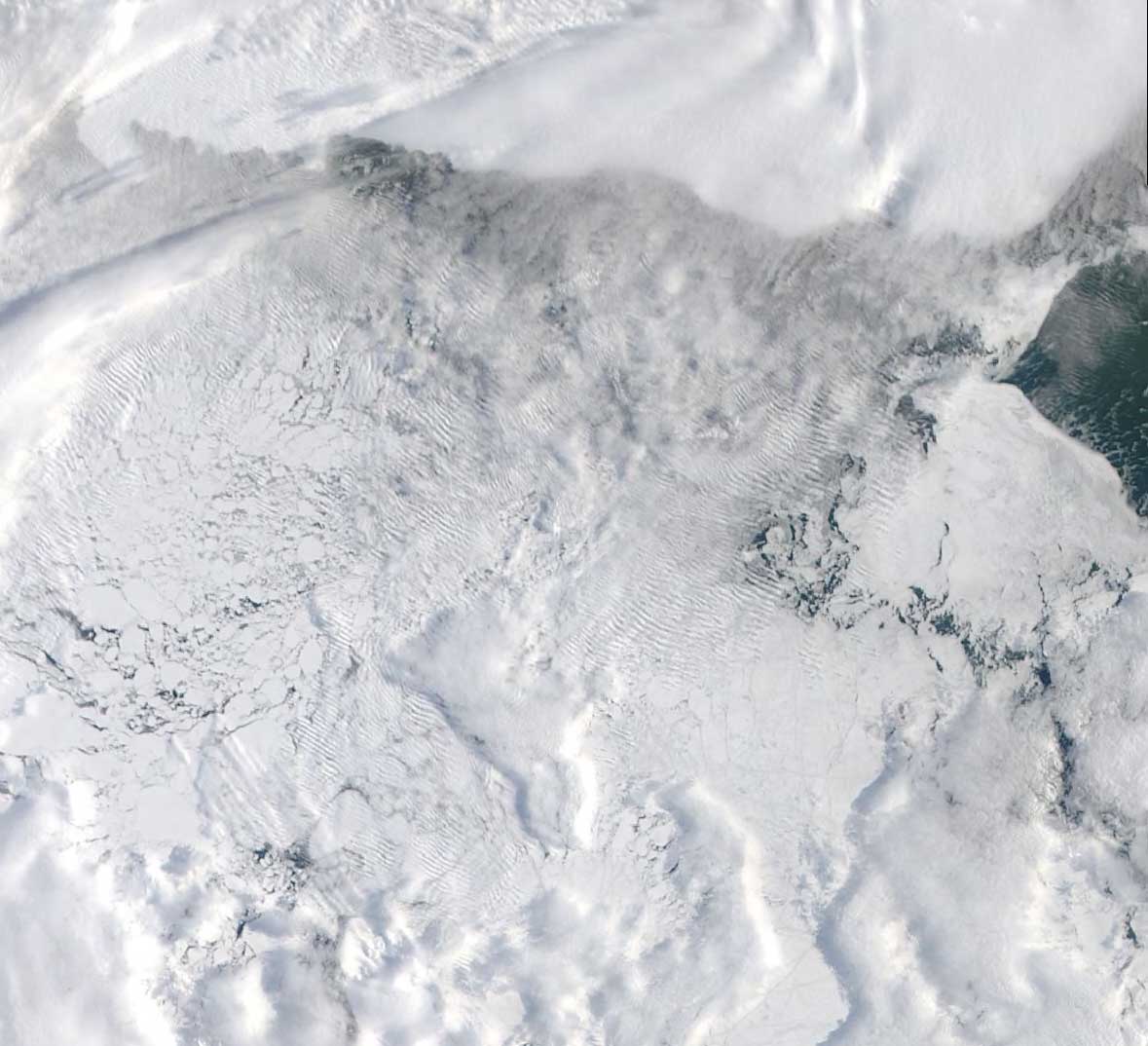
Today we called it a day early. Have a lot of questions to our mainland. Hoping to get satellite photos from Saint Petersburg and the weather forecast from Moscow. Perhaps the American National Weather Service will provide some information as well.
Right now we are just a kilometer away from the shore. Spent the whole day traveling on fast ice. Yesterday, in the morning the red truck fell into a deep hole. Didn't see it because it was well covered with a fresh snow. But this mishap served at least some purpose: while pulling it out we refreshed our recovery skills. On the same day at night one of the water pumps gave up and we had no choice but to replace it with a new one. We don't have a whole lot of spare parts but we do carry some of the most essential.
Yesterday for supper we had slices of venison; for those not accustomed to this kind of exotic food we served rice with hot dogs. After that had to struggle with our computer but finally the mysterious "FTP" started to work. Most likely I'll never find out what this "FTP" means but it's not really important. The weight of regular spare truck parts is still greater than the weight of all kind of parts with the USB wires but I foresee the moment when the latter will predominate.
The modern polar explorer should be able to handle "traditional" and modern equipment equally well. In most cases it hasn't happened yet, but there is always hope.
Best regards to everybody.
Yours truly, Vassily Yelagin
March 4, 2015, N70°49,542, W159°30,297. ODO 135km.
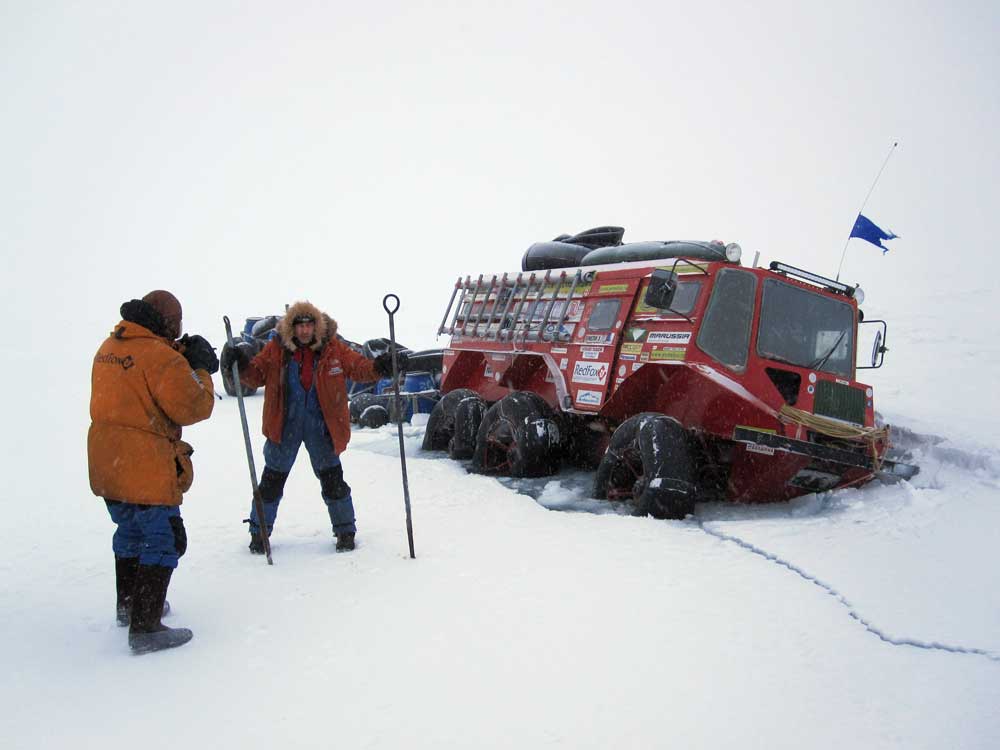
Since morning t – 25°C, light west wind. Pressure 1013 mbar. Full moon. The first full day en route. Yesterday we departed from Barrow. The lads from UMIAQ company that provided to us the garage, accommodation and all the rest, bid us farewell. Everybody with whom we have dealt these days were very friendly and helpful, Nuck, Mike, Shan and all, all, all, many thanks to you! The welder with a simple American name - John Kennedy -presented a thermos bottle on which he wrote with a felt pen: “From John Kennedy, welder”, in order, God save, not to be mixed up with someone else. We did not manage to leave Barrow without adventures; we got on the ice still within the boundaries of the town, and as it always happens in such cases, we got stuck in the view of numerous spectators. After demonstrating to them our masterfulness in handling the spade, at last we drove off to the White Silence.
After 20 km, the rear trailer broke off the green caravan, but that’s nothing, we are accustomed to such things. We repaired it in an hour, and it’s high time for supper, we ate with good appetite accompanied by whistling of somewhat stormy wind outdoors, but inside it is comfortable, and the chief allowed 100 g of spirits. When something wrong happens with the leading vehicle, the rear vehicle drives close without hurry, and its crew starts reasoning (sidewards), that it’s no good driving so fast, we cannot manage to keep up, etc. When the leading vehicle is changed, the situation changes for the opposite.
We saw a polar fox, caribou deers, traces of a big bear and a small airplane flying suspiciously close to us.
Regrettably, up to now there is no answer from the U.S. National Ice Center on our request to provide us the satellite photos of the ice cover; for us it is the most important thing now.
Greetings to everybody, and till next communication session.
Vasily Yelagin.
March 3, 2015 ã. 6.45 AM. Barrow
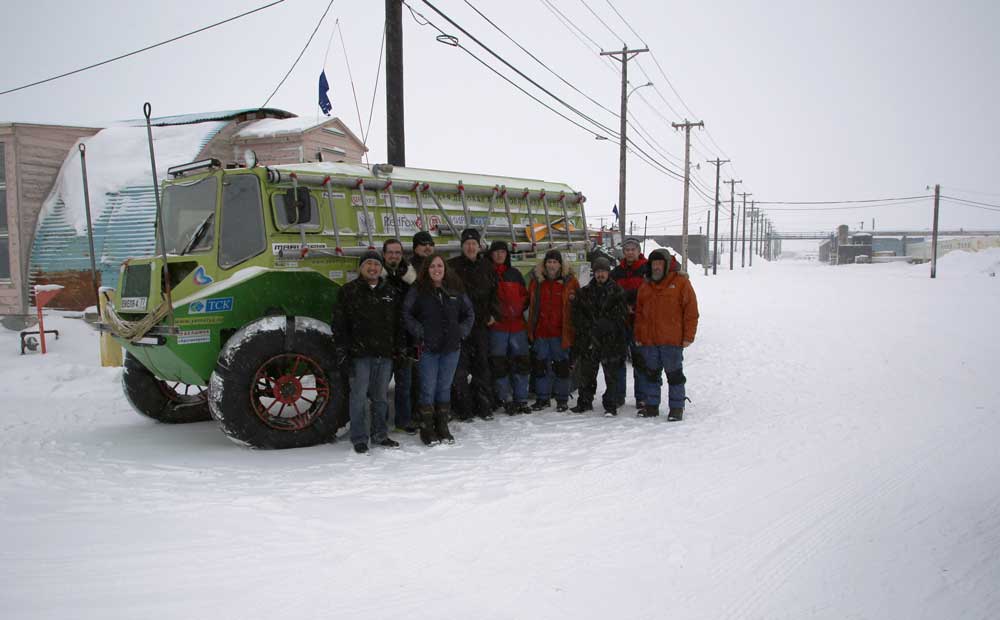
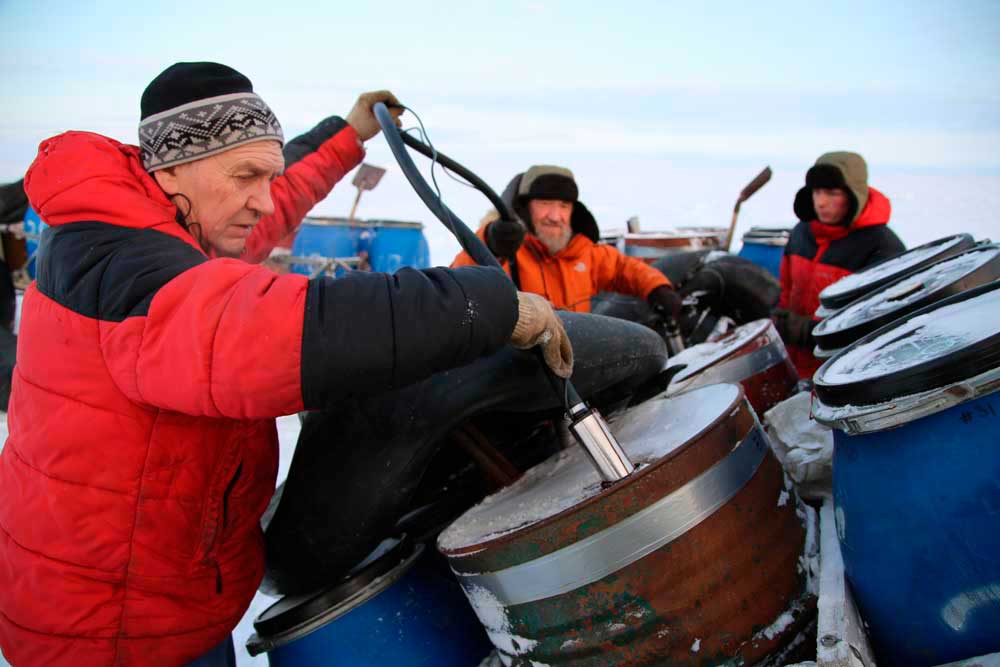
Everybody are still in the arms of Morpheus, only Yelagin is not sleeping, Yelagin is writing to the Operations Department.
The first day after arrival to Barrow was marked by meeting with the FBI representatives. Polite men (it seems that this term is popular not only in our country) inspected our luggage, asked some questions and departed for home, to warmer places. The next two days were devoted to intensive houshold-related activities. Replacement of shock absorbers and tires are uncomplicated operations, but taking into consideration that our vehicles have 14 shock absorbers in total, and the caravans have 24 wheels, one might feel pity for us. We have 36 barrels of various loads, not to count for the fuel, while Obikhod is all alone, as distinguished from the "polite men", and his responsibility is not to search for an "intelligence man’s kit", but to put everything in order, to arrange and to record everything that was bought recently. Moreover, to record in such handwriting that will be possible to be decrypted later, even though involving the efforts of the entire team. This damned handwriting takes the last strength remaining in the veteran member of polar expeditions, but someone has to fulfill this hellish job. The war of worlds and political views has not reached this place, the attitude of local people towards us is still friendly; we, after reading the Soviet newspapers, were anticipating the cold war, but the atmosphere here is much warmer than in Moscow – here it is, the warming-up.
Meanwhile, the weather here is not up to the mark, strong wind blowing day after day has finally shifted the mass of ice and formed the coastal flaw lead. The learned people to whom we send the questions: “how should we live further?” give, for the most part, contradicting answers, and that’s right; we must think by ourselves, how to break through to the Motherland. I am finishing my message at this manly note, it’s high time to take the leadership, otherwise there is risk that no coffee will be left. Best wishes, and till next communication session. The ice broke up, ladies and gentlemen, today we are departing!
Vasily Yelagin.
February 25, 2015, 18:00 UTC-9, Anchorage, Rabbit Creek st., Brien Reep’s house.
We are recovering ourselves after 20 hours of net flight, and purchasing foodstuffs under wise guidance of Brien’s wife, Lena. A beautiful view on the sea, on Anchorage opens from the windows of the house which is standing on the hill slope; gorgeous mt. McKinley is seen far away. Yesterday we were lucky: over Greenland the sky was clear, and we enjoyed viewing a magnificent panorama. Then the luckiness continued, and in spite of gloomy predictions made by consular officers and my elder brother, we spent in the queue at the border not 2 hours as predicted, but just 15-20 minutes, formalities for import of arms took another 10 minutes, and we avoided trying our patience by renowned New York traffic jams. Instead, we managed to see at a distance the famous huge brass lady. All is well, except that we feel awfully sleepy; it is inconcievable for a normal human – how the Americans can live in such a time zone? Just look, in our country the chiefs are shuffling summer time/witer time and the time zones as they wish, and the population is happy. The weather in Anchorage is warm, the nasty global warming-up reached this place also; the starting point of the famous thousand-miles-long Iditarod Trail Sled Dog Race was relocated to Fairbanks, perceptibly further to the north. It is warm in Barrow also, but in the Arctic manner: just minus 15 degrees Celsius instead of minus 30. We are departing for Barrow by airplane on the 27th, the cargo consisting of wheels and other small items are already there – now it’s our turn.
Greetings to all and till next communication session,
V. Yelagin.
February 10, 2015. Preparing to depart for Alaska, Barrow town.
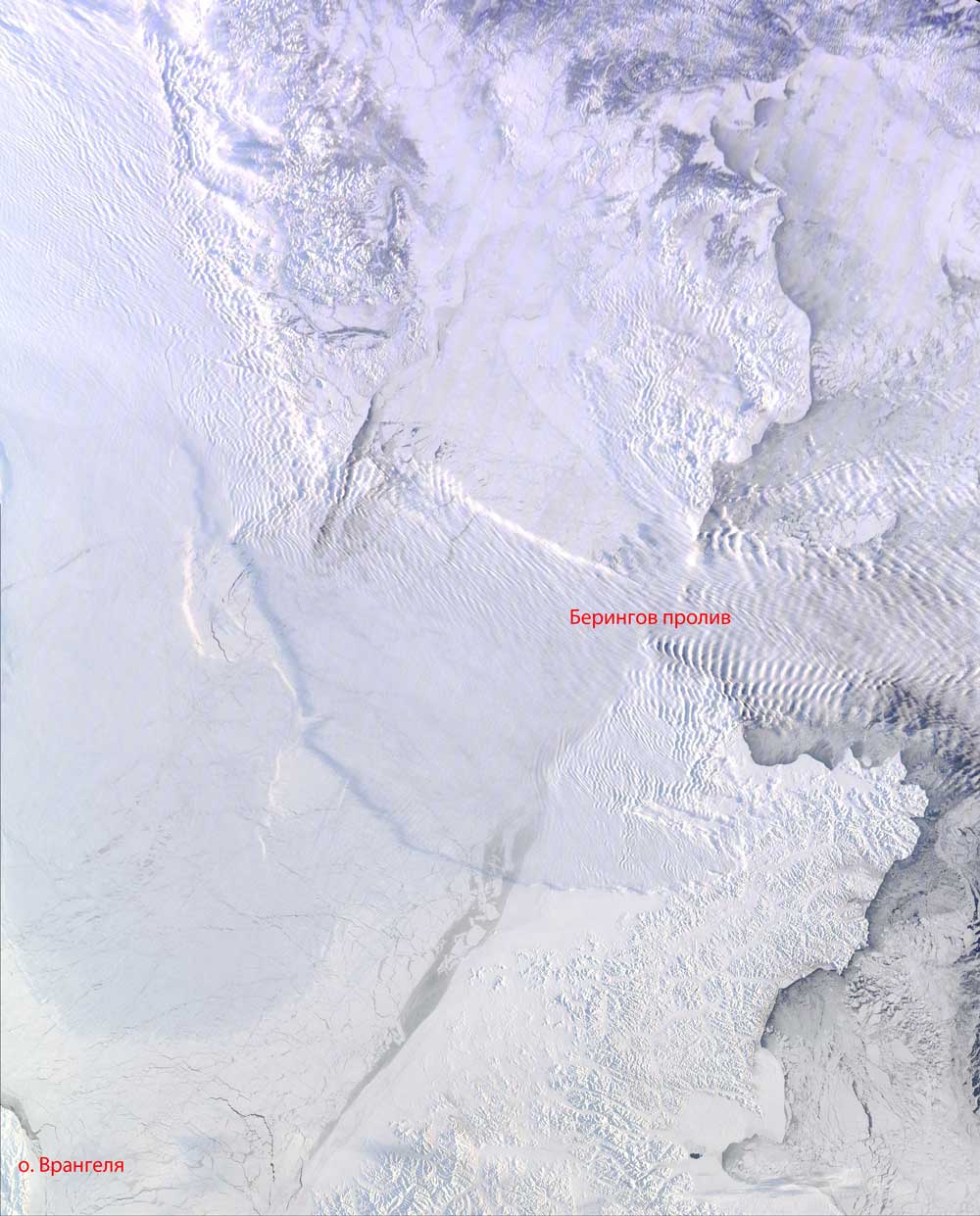
We are collecting the cargo: tires, shock adsorbers, various minor items. The vehicles are in running order, but time has come to replace some expendable materials, including the tires.We shall buy the foodstuffs in Anchorage, so that in Barrow we will be concerned only with preparation of the vehicles and packing of the caravans.
So far there is no permit from the Americans for import of guns, though there is a strong desire to have them with us: we are moving to the area where the density of bears is the highest in the Arctic. Last year we managed to get such a permit; this year some problems have emerged. Our customs are ready to release duty-free the cargo of tires and spare parts, as a non-commercial cargo; the passes for stay of our team in the border zone were issued. So, it's OK. We are in the process of preparation, being aware that if everything would be going smoothly, nothing would be to recall later. Even famous Sir Ranulph Fiennes in the book "To the ends of the earth" wrote about his visit to a high-ranking office-holder: «he tenderly looked into my eyes, listened to the summary of the project and said: "only over my dead body"». In this context, our dither with the Americans and with the representatives of various other authorities seems like a child's babble. The process is going on, we have enough support, but the schedule is pressing… The letters sent by post from one place in Moscow to another place within Moscow are crawling for a month or longer, without any chance to inquire about their fate; but when a long-awaited phone call is heard, or an e-mail message with a yet another permit is received, – it is a true catharsis. For example, until now Sergey Isayev has not obtained the American visa; the situation gets tense, as he is one of the most needed men for the travel. We are already being awaited for at the Wrangel Island and in Pevek, as well as in Tiksi, not to say about Dudinka, from where we departed to the North pole in 2011, Farther George has blessed us there for the long journey. Three years traveling overseas, enough's enough; it's high time to turn home.
It is necessary to sweep clean the matters at work; in accordance with the well-known law, the heap of urgent matters is abounding precisely before the departure – but it’s the same sort of thing every year, even some immune resistance has developed, natural protection against routine, when it seems that this whirl is the most important thing in life.
This time I am planning to concentrate on photographing; Alexey Ushakov will be relieved of common work as far as possible for the purpose of video shooting, and the remainder of the team will bear the main burden of moving the caravan ahead. Thank Heaven, the people are experienced, no teaching is necessary, most important – everybody has experience, patience and the ability to wait.
It is already clear that crossing the Bering Strait is the most challenging stage of the entire project; ice in the strait is very mobile, and though the distance seems short as compared with the journey across the ocean, it can present a plenty of various surprises. Members of the Association of Polar Explorers insistently recommend to head from cape Barrow directly to the Wrangel Island, and this distance is already comparable to the distance from the Arctic Cape to the pole. It is very tempting to cut the route and to drive off the coast of Alaska closer to Point Hope in the direction of Enurmino, but the risk of getting in the ice mincer increases substantially, what is extremely undesirable. All in all, "it is necessary to get engaged in the battle, and then we'll see".
We shall depart from Moscow by air on February the 24th, and expect to be in Barrow on the 27th. About 2-3 days for speeding-up, preparation of caravans – and we shall start off. Since mid-February I am planning to start monitoring the ice situation in the Chukchi Sea, closely studying the satellite photos every 3-4 days. The element of luck is also necessary in this work; optical photos are the best suited for this purpose, but they may be obtained only in case of clear weather. Such is, in short, the state of our affairs three weeks before departure.
Vasily Yelagin.